 By Pepper Parr By Pepper Parr
February 27, 2014
BURLINGTON, ON.
Sometime next Tuesday afternoon city council meeting as a Standing committee will recommend the current operating part of the 2014 budget. Traditionally that recommendation goes to city Council about ten days later for final approval and the tax rate is then set.
Citizens then have an opportunity to delegate before city council and attempt to plead for changes to the budget.
People in Burlington will not have an opportunity to do that this year. Council voted on Thursday to have the Mayor call a Special Council meeting immediately after the Standing Committee meeting and approve the budget immediately. There will be no opportunity for the public to delegate because they will not know when the meeting is taking place.
Councillor John Taylor moved a motion on Thursday that the budget be made final at a scheduled council meeting on March 17th. There was very little debate on the motion and Councillor Taylor wasn’t particularly direct or forceful with his comments. Councillor Meed Ward was direct; the city manager didn’t seem to care if the date was set back to the March 17th
The vote lost 4-2; Mayor Goldring had left the Standing Committee shortly before the vote.
What is disturbing with the vote is that Council is being very deliberate in not ensuring the public has some opportunity to read about the contents of the budget; go on-line and watch parts of the debate if they wish. It is almost as if this council has something to hide and at this point we don’t see that as the case.
It is a complex budget; we still don’t know what they plan to do with the $2.6 million 2013 surplus which they call retained savings. Staff had difficulty getting some critical reports before the Standing Committee on time – which meant the public didn’t get much opportunity to inform themselves. The transit advocates are close to spitting nickels over what they call the transit shenanigans.
The report on what the snow levels are to be before equipment is put out on the road was late – part of the reason for that was due to snow still falling.
 “I don’t want to hear anymore delegations” said Councillor Jack Dennison. Councillor Dennison said he didn’t want to hear any more debate on spending decisions; Councillor Sharman felt the public had had more than enough opportunity to make themselves aware of what council is doing. Not quite sure how he arrives at that conclusion when council has yet to make many of the budget decisions. Councillor Lancaster has never been a big fan of meeting with the public.
The public was given just the one opportunity to look at the budget in an open public meeting when they met at the Art Centre in January. . At that time people complained that they didn’t see anything before the meeting and that all they were able to do was respond to what was put in front of them.
There were close to 100 people at that January meeting which was held south of the QEW. Burlington now has a brand new campus in Alton Village where a second public meeting could have been held. The finance department staff chose not to do so this year but have indicated they will do so next year.
In 2010 Burlington received the Shape Burlington report; a document put together by the late John Boich and former Mayor Walter Mulkewich who were supported by a strong committee that, believe it or not, included Blair Lancaster and Paul Sharman before they were elected to council.
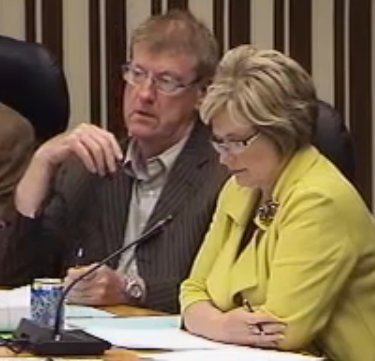 Councillors Sharman and Lancaster: both part of the Shape Burlington committee who seem to have forgotten what the report was all about – civic engagement The Shape Burlington report made it very clear that Burlington suffered from an “information deficit” – the public just didn’t have the information they were entitled to – city hall wasn’t making it available.
When the report got to Council it was unanimously adopted – then apparently forgotten.
An informed public can make informed decisions and given that it is the public’s money that is being sent giving them an opportunity to make themselves fully aware would seem reasonable.
It is sort of like the cashier not letting you see the tape with all your purchases on it but just grabbing your cash and ringing up the sale.
The public is entitled to better treatment and if democracy is to prevail the elected officials should ensure that the public has more than adequate opportunity to inform themselves.
Odd that the four people who voted against giving the public time to review the budget decisions plan to ask the public to re-elect them to office in October.
Background links:
Just the one public meeting on the budget – comments are telling.
Shape Burlington points to “information deficit”.

 By Ray Rivers By Ray Rivers
February 27, 2014
BURLINGTON, ON.
“President Yanukovych has been made illegitimate. It’s very worrying, especially because Russia lost in hockey, they’ll be in a bad mood. We fear Russia’s involvement in Ukraine.”
Trudeau made himself a target for those questioning his maturity for the job of Prime Minister with this inappropriate comment and poor joke, given the tense situation in the Ukraine. Of course this is exactly what everyone is wondering – the ‘Russian bear in the room’– it’s the media has been discussing ever since the Ukraine went into crisis mode.
And not everyone was offended by the remark. For example, the Russian ambassador to Canada, Mr. Mamedov, during an interview told the media, “I’m turning serious, because I know you don’t appreciate jokes.” But Trudeau should not have linked Russian military action to the Olympic games – the games of peace. And Canada did make a spectacular showing at Sochi, ten golds including back-to-back hockey and curling.
 The Dufour-Lapoine women at the Olympics. A lot of money has been devoted to preparing athletes for the Olympics and it clearly has paid off. The Harper government has been throwing something like $150 million into the pot, Ontario another twenty million or so, and Quebec even more. Ontario had 63 Olympians competing, Alberta was right behind with 55,and B.C. fielded 30. But forty percent of all the athletes came from Quebec, prompting one news medium, reflecting on early returns (9 medals), to speculate that were Quebec a separate nation it would have placed third and the rest of Canada sixth.
The federal Liberal party held its biennial policy conference in Montreal last weekend and Justin Trudeau delivered an upbeat speech – including better jokes. One session involved the three eastern Liberal premiers and provincial party leaders from New Brunswick and Newfoundland. Kathleen Wynne spoke passionately and sincerely about the need for ‘nation-building’ by the federal government. She complained about the frustrations of trying to work with a senior level of government which refuses to consult the provinces and acts unilaterally on issues which affect them, including job training, health care, education, pensions and infrastructure.
Most impressive of the panelists was the fluently bi-lingual and articulate would-be premier from New Brunswick, Brian Gallant, as he switched between English and French with more ease than anyone I’ve ever witnessed before. I couldn’t help wondering how different things would be in this nation if we could all communicate like that. It was some 19 years ago when Quebecers came close to a ‘yes’ vote for sovereignty in that last referendum. And we know there is another one down the road, once Premier Marois wins the next provincial election this year.
I recall that last referendum. My daughter and a close friend skipped school to train down to Montreal and join the throngs pledging their love for Quebec as a part of Canada. I have rarely been more proud of her. And it was her and all the others across the country professing their love for the people of ‘la belle province’ that, I believe, convinced those last-minute Quebec voters to scratch their check marks for Canada, even as the Chretien government was sleep-walking through it all.
 A massive Canadian flag was passed hand over hand amongst a huge crowd in Montreal days before the citizens of Quebec voted in their referendum to remain a part of Canada. It was a race of Olympic proportions and Canada won by a squeaker – but the separatists demonstrated their competitive ability, not unlike Quebecers in the Olympics. Come the next referendum we can expect the separatists to be even more competitive. This will be a provincial government which has learned from two earlier failed attempts, and a federal administration which, like Chretien’s, doesn’t want or know how to get engaged.
René Lévesque had always planned to hold his 1980 referendum while Joe Clark, with only 4 seats was in power, but Trudeau the elder came back with majority support in Quebec and trounced him. One could surmise that Jean Chretien’s modest support in the province (about a quarter of the federal seats) contributed to the near loss by the forces of unity in 1995.
Pauline Marois would love to run her referendum while Mr. Harper is in power, given that he has no more political support in the province than Joe Clark did back then. If she waits until the election she might end up fighting the Quebec-popular NDP; still a federalist party though one promising an easy sovereignty exit with 50-plus-one percent ‘Yes; vote. The federalist Liberals appear strong in today’s polls but winning nationally, and winning in Quebec, is still a crap shoot at this point. Then there are the Tories, who might just get re-elected but are unlikely to improve their Quebec numbers.
Today, as we watch the Ukraine struggle with nation-building amidst threats of secession from minority regions it behooves us to contemplate how a successful ‘Yes’vote on sovereignty would play out back here. It is true that Quebec is a net recipient of equalization and some other economic benefits for being part of Canada. However, we should remember that the financially crippled Ukrainian people rejected the huge Russian multimillion dollar bailout, and expect a similar response from Quebec.
It will be instructive to watch how Scotland votes on its independence referendum this coming June. The pundits are betting the Scots will vote ‘No’, but then this is only their first referendum.
 Is this the kiss goodbye from a Quebecers or just a happy Olympian who happens to be from Quebec? Charle Cournoyer of Canada celebrating his Bronze medal win in the men’s 500 metre short track speed skating event on February 22, 2014 at the Sochi Winter Olympics. Quebecers are a passionate lot, something they clearly demonstrated at Sochi, even under the Canada banner. The next referendum will not be played out on the pocket books of Quebecers, it will be won by what is in their hearts. A dis-interested, almost hostile, federal government is exactly what the separatists are hoping for – and that is what they are getting.
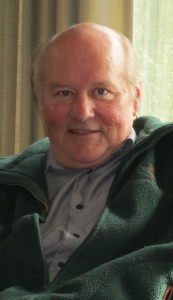 Ray Rivers writes weekly on both federal and provincial politics, applying his more than 25 years as a federal bureaucrat to his thinking. Rivers was a candidate for provincial office in Burlington where he ran against Cam Jackson in 1995, the year Mike Harris and the Common Sense Revolution swept the province. He developed the current policy process for the Ontario Liberal Party. Ray Rivers writes weekly on both federal and provincial politics, applying his more than 25 years as a federal bureaucrat to his thinking. Rivers was a candidate for provincial office in Burlington where he ran against Cam Jackson in 1995, the year Mike Harris and the Common Sense Revolution swept the province. He developed the current policy process for the Ontario Liberal Party.
Additional information links:
Trudeau’s Joke
Reaction Russian Worries Apology Sochi Olympics Own the Podium Quebec Athletes
Early Medals Trudeau Speech in Montreal Quebec Anglophones Liberal Premiers

 By Pepper Parr By Pepper Parr
February 27, 2014
BURLINGTON, ON.
Got an email from Yasir Naqvi, an Ontario Liberal party MPP who told me he was proud to stand with Premier Wynne when she announced the government was increasing the minimum wage to $11 an hour on June 1st of this year.
The government introduced the Fair Minimum Wage Act in the Legislature which is apparently going to tie all future increases to inflation because it will create consistency for businesses and Ontario workers.
While the increase is certainly welcome – why is the province being so cheap. A household hasn’t a chance of getting out of poverty at $11 an hour. Indexing that amount to the Consumer Price Index (CPI) assures society that those below the poverty line will always be there.
The increase to $11 an hour in June is fine. Now take it up to $12 in a year, then to $13 a year after that and then to $14 a year after then THEN index the amount to the CPI.
Naqvi assures us that “businesses, labour groups, youth and workers support our legislation because they helped shape it: the Minimum Wage Panel was made up of all these stakeholders. They held province-wide consultations, received over 400 submissions, and brought forward unanimous recommendations that we are acting on.”
I’ve yet to meet anyone earning a minimum wage tell me that they are happy with this increase and the indexing.
MPP Naqvi points out that “the New Democrats ignored the Minimum wage panel and were silent on minimum wage—in the House, the media, and the by-elections. After a year of ducking, it’s too late for the NDP to try and be leaders. They need to do the right thing and support our plan.”
“Between the NDP’s flip-flopping and the PC’s radical ideas, we know the opposition will try to stall, so we need your help to pass this legislation.”
That’s just so much politicking – shame on the Ontario Liberals for doing this on the backs of the poor people.
“The Liberal plan for jobs is practical and it’s realistic” says MPP Naqvi. “Together”, he adds “ we are building a fairer, more prosperous Ontario.
There is no fairness in this act and at $11 an hour there is no prosperity for people earning a minimum wage.
Revise the bill Madame Premier make it really fair and decent.
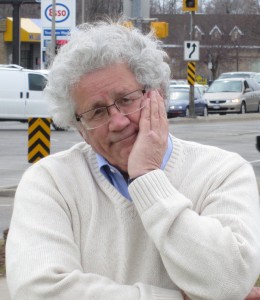 Pepper Parr is a lifelong Liberal who has voted for every federal Liberal leader as far back as Louis St. Laurent. He has served as the president of Liberal Party Associations on more than one occasion. He is the publisher of the Burlington Gazette and expect to tell the Premier that her that the “fair”of the minimum wage act just is missing. She can fix that. Pepper Parr is a lifelong Liberal who has voted for every federal Liberal leader as far back as Louis St. Laurent. He has served as the president of Liberal Party Associations on more than one occasion. He is the publisher of the Burlington Gazette and expect to tell the Premier that her that the “fair”of the minimum wage act just is missing. She can fix that.

 By Pepper Parr By Pepper Parr
February 23, 2014
BURLINGTON, ON.
The process Burlington Transit is going through as they rationalize their routes and look for more efficient ways to serve the needs of those who choose to use transit and those who have no choice got me to thinking longer term.
Stay with me on this.
Students or first time drivers have to go through a graduated license process and don’t get to drive on the 400 series highways the moment they pass their first test.
 It will not be too long before rules like that are going to apply to seniors. I personally find that my eyes don’t work the way they used to in the dark of night and my reflexes aren’t as sharp as they were when I was 25. It will not be too long before rules like that are going to apply to seniors. I personally find that my eyes don’t work the way they used to in the dark of night and my reflexes aren’t as sharp as they were when I was 25.
I frequently find myself driving behind a senior who gives the word cautious a whole new meaning. There is timidness to older drivers and once there are more of them on the road – and that day is not far off – traffic is going to move slower.
Between older people driving slowly and young people believing they can text and drive, the roads in town will become hazardous places. But that is not my point.
 We will need buses that can carry dozens of people with walkers – because they won’t be driving. I believe there will come a time when the province will require doctors to report any patient whose responses are such that they perhaps should not drive at night. Many of you know of adults who have had to go through the difficult process of telling Dad that he has to give up the keys to the car and not renew his driver’s license.
What do those seniors do then? Are they to be land locked in their homes – because they aren’t going very far with the service Burlington Transit offers?
It doesn’t require a degree in rocket science to figure out how many seniors we have and where they live – the federal census data will give you that information. We already know in large numbers how many seniors we have and which postal code they live in.
We know where the libraries are, where the food stores are and where the hospital is. If we know the ages of the people in this city, and we know where they live and where they will most likely want to go – then we can begin thinking about what kind of transit we are going to need to move these people around.
That is the kind of long term thinking a city council should be doing. I have watched and listened to council members discuss how many people were on a particular bus route at a specific time – none of their business – that’s what the transit people do.
Council’s job is to think today and plan for tomorrow on how the city is going to meet the transit needs of all the seniors that we are going to have living in the best medium size city in the country.
 Specialized buses will be needed and it will take longer to load passengers. When the capital budget for the next 10 year is drawn up there should be funds set aside to buy the kinds of busses the seniors will need. We need to begin putting money into that reserve find now and doing some early education work as well.
Perhaps we will see a Staff Direction to this effect sometime soon?
Will Burlington lead in the transit service it provides its seniors?

 By Pepper Parr By Pepper Parr
February 21, 2014
BURLINGTON, ON.
In the old Soviet Union, if you didn’t deliver they took you out and shot you. The Soviets have cleaned themselves up and the Koreans now do that. Sweden has always been a kinder softer country – but bet everything you have on someone at IKEA having to refresh their resume over the massive screw up on the decision to look at the North Service Road property as a possible new home for them in Burlington.
Multi-national corporations don’t make mistakes like this. IKEA has a brand, we now call all the strong brands iconic these days, that they promote heavily. They wanted that brand visible from a roadway where there is loads of traffic. Thus the decision to find a property along the QEW. That part of the decision making process IKEA went through may have been the only part that made sense.
There were problems galore with the site – there were also a lot of problems with the way IKEA said they wanted to situate the buildings and parking on the site.
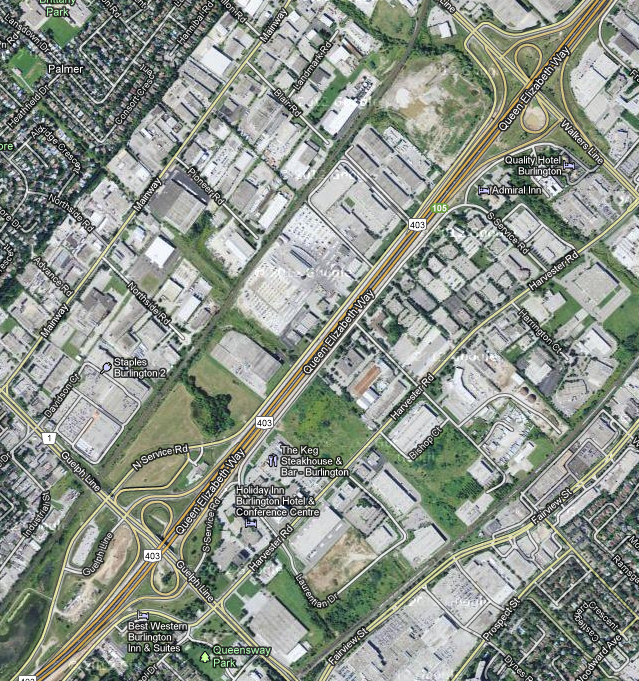 A portion of our prosperity corridor – IKEA had picked a spot close to Walkers Line. The Burlington Tourism office will tell you that IKEA was close to the #1 tourist attraction in the city; they drew from a dense and very rich market. We are the only IKEA operation west of the GTA core.
A five minute drive along the North Service road made it very clear the road would have to be widened to at least four lanes. We did that back in June of 2012 and reported on that.
A little research would have revealed that the Ontario Ministry of transport wanted more room to expand the width of the QEW and the only width available was to go north – which meant pushing the North Service road back – which would eat into the property IKEA had taken an option on.
The property has a barrier on the north side – a railway line. Walkers Line was known to be close to its capacity – so there was work to be done there. Creating a turn from Walkers Line onto the North Service Road – going both east and west was a challenge
Add to all that – the Creek that runs along the eastern side of the property.
IKEA is taking the public position that the site is not quite what they need – take that position with a grain of salt. The IKEA spokesperson assured anyone who asked that the decision was strictly based on the site. She added IKEA Canada is doing well financially.
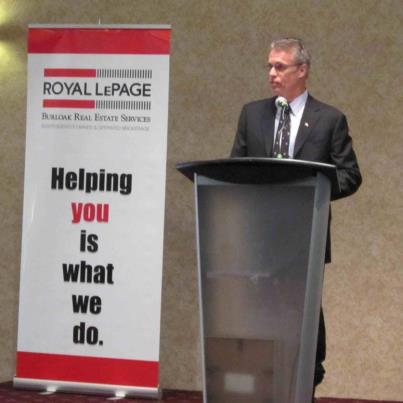 Mayor Rick Goldring Burlington’s Mayor is “discouraged” but adds that the IKEA application “did identify a need for infrastructure improvements”. It did much more than that; it showed land that was being very much under-used. Goldring does see a “silver lining” – the IKEA application showed that the transportation corridor either side of the QEW had to be improved. Did we have to wait for the IKEA application to figure that one out. The economic development master minds should have known that – and the planners could have at least suggested we pay some attention to that part of town. McMaster moving to the South Service Road should have been hint enough.
The city has managed to convince itself that IKEA pulling out has given us an opportunity to create a shovel ready site for anyone who wants to move to Burlington. Has anyone seen the line-up of people wanting to move to Burlington?
In the world of property development – two things matter: location and timing. Why it took IKEA a couple of years and perhaps as much as $1 million to arrive at the conclusion that the site wasn’t what they needed is a tough one to get ones head around. IKEA had made a decision to move. The objective was to have space for the headquarters office. They also wanted to expand the sales side and offer WHAT. All those IKEA plans are still relevant. IKEA’s intention was to WHAT and the city rezoned the property so they could do that.
IKEA lives in a competitive environment – they fight every week for market share. What they sell in this market works its way all the way back to the head office in Helsingborg, Sweden, where they are now asking a lot of questions. If some IKEA heads don’t role there are surely bonuses that will be a lot smaller.
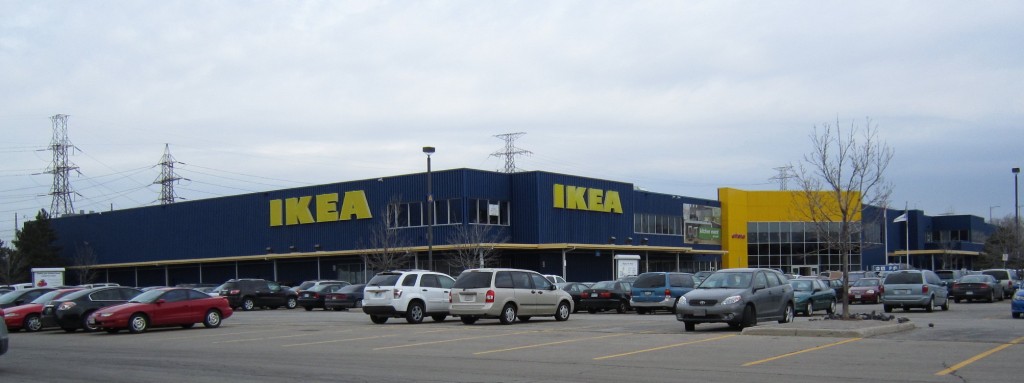 IKEA wanted to be bigger and a whole lot better – and that plan isn’t going to change. sooner or later – they will move from this site. IKEA has a very interesting corporate structure. At the top is a holding company in Luxembourg, tax reasons for that, with group services in Belgium, Franchise in the Netherlands, retail Centre Division in Denmark, and Finance in Sweden. The company appears to work as a series of national franchises – wonder who owns the Canadian franchise? The whole operation is owned by two parties: 51% Inter IKEA Group and 49% INGKA Group. Complex!
Burlington is trying to put the best face possible on the disaster – and make no mistake – this is a disaster for Burlington. Not only is there a major client that is not happy, even though much of the mess is their own fault, there is revenue that is lost to the city and we are now in the unfortunate position of having to pay for all of the changes needed on Walkers Line by ourselves. IKEA was going to be picking up a lot of that expense.
We have also done ourselves a lot of damage in terms of reputation. The development community knows we parted ways with the former Executive Director of BEDC. There aren’t that many job opportunities in that field; there are some good people out there but they don’t want to align their careers with loser communities and right now Burlington isn’t looking all that good.
Heaven’s Hamilton is seen as one of the top ten development growth communities and we all know how dysfunctional that city council is. Burlington has to figure out quickly what it needs to do and then do it. The problem is that the only people who can manage this type of problem are up to their arm pits with other tasks that are just as important. The city manager is a) re-casting his capital budget, b) totally revamping the way services are to be delivered and making people personally accountable –talk about a culture shift; c) reviewing the work force the city has and aligning it with the human resources we have and are going to need. He doesn’t have the time to resolve this problem and the one person he has that can do the job has his plate more than full as well. The city manager unfortunately doesn’t have the bench strength he needs to run the place and it is going to take him three years, at a minimum, to re-develop all of the human resource side of the city.
 Heck BEDC can’t get themselves to the point where they are ready to go to market and find the person they need. They have to restructure and get that approved at the May AGM. Heck BEDC can’t get themselves to the point where they are ready to go to market and find the person they need. They have to restructure and get that approved at the May AGM.
Thinking that we can wait until the BEDC AGM in May is what a high school student might try. Is that our level of sophistication?
The Mayor and Councillor Dennison seemed to have found a silver line in all this; if IKEA couldn’t work through the difficulties with the location what makes us think someone else will? The forthcoming staff report will sum up everything – but that’s about all. Bet on someone finding a way to thank someone for all the hard work that was done.
There is trouble in paradise. The silver lining the Mayor is talking about might be a thought to put the new city hall on the site. The late James Gandolfini of The Soprano’s fame had a word for ideas like that – “fu-ge-da-boud-it”
There are three IKEA stores in the GTA market, Burlington, Etobicoke, and North York. There is a store in Vaughan and a store in Ottawa. There is room to the west of Burlington for an IKEA store and Hamilton’s demographics are becoming a lot more appealing to IKEA.
While IKEA has made a decision to remain in Burlington, that may well be just a place holder. They wanted bigger and better and they put their money on the table to get that. The deal couldn’t be closed – someone else, somewhere else might come along with an offer IKEA just can’t refuse – and don’t for as much as a second think that there aren’t people out there right now figuring out how to cook up a deal.
Hamilton took International Harvester right off our plate. Are we going to see a repeat of that kind of play?
One of the smarter commercial real estate types we talked to said: “this is embarrassing”; it might also turn out to be very expensive. Add this one to the egg on our face with the pier and we aren’t looking so good right now.
Background links:
North Service road couldn’t handle traffic load.

 By Ray Rivers By Ray Rivers
February 18, 2014
BURLINGTON, ON.
“The single most important thing the government can do to secure Ontario’s prosperity is to eliminate the deficit.” This statement appears at least three times in the 2013 budget document, as if to leave no uncertainty that Ontario’s ballooning debt is front and center of all policy. That debt now has risen to match that of the federal government as a percentage of gross domestic product (GDP) – approaching 40 percent.
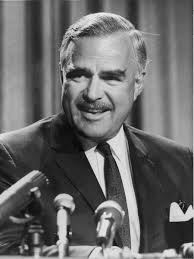 John Robarts – one of the best Premiers the province ever had: knew how to balance a budget. I grew up observing John Robarts, nicknamed ‘the Chairman of the Board’ for his commanding leadership of Ontario. He presided over unprecedented economic development, with up to 8% growth rates during the 1960’s. He gave us our single-payer health insurance, modernized the public service, introduced bilingualism and education reform and was known for his balanced budgets.
His successor, Bill Davis, on the other hand, governed the province form 1971 to 1985 but never once balanced a budget. David Peterson eked out a small surplus in his last year in office and we all know that Bob Rae’s NDP never even came close. For all his big talk, Mike (the knife) Harris managed only four balanced budgets before quitting politics, leaving his next inevitable deficit for Ernie Eves to announce. Then Dalton McGuinty’s Liberals registered three balanced budgets in a row during their first eight years in office.
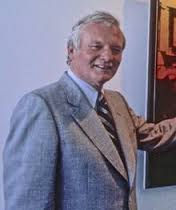 Bill Davis had problems learning how to balance a budget; never really did learn. In fact, if we add up the budgetary performance of all governments over the last forty-two years ago, going back to when Bill Davis became Premier, we’d find that the Liberals and Progressive Conservatives delivered exactly the same number of balanced budgets – four a piece. And, the Tories held power for five more years than the Liberals over that time frame. Thus, this myth that Conservatives are somehow better at managing the deficit is pure and utter rubbish. This is also true for the federal political parties.
John Robarts benefited from a truly progressive income tax system where the wealthy paid their fair share, and the middle class prospered. Mike Harris, by contrast, made huge cuts in income taxes and paid for them by slashing public programs – primarily welfare, health care, education and municipal services. Given the magnitude of Harris’ austerity program, he should have been able to balance all of his budgets, had he just not cut income taxes as he did. As the current federal finance minister is fond of saying – there is no free lunch.
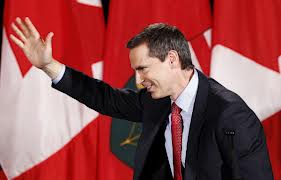 Dalton McGuinty balanced some budgets – but budgets weren’t his downfall – the gas plant fiasco did him in. McGuinty raised taxes modestly on coming to office, introducing the Health (insurance) Premium. But then he further cut corporate and personal taxes, ironically, at a time when the economy most needed more tax revenue to deal with the consequences of the 2008 global meltdown. As a result the provincial debt which has nearly doubled since 2004 is now a priority for Premier Wynne.
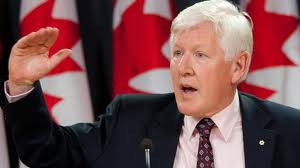 Bob Rae couldn’t catch a break anywhere and had the misfortune of getting hit by an economy no one was able to manage. The lack of any experience running a government didn’t help. Balancing a budget requires tough choices, compromise and determination. Bill Davis had the good fortune to inherit a well-run and funded government, yet failed to keep his expenses in balance over his fourteen year run. Mike Harris squandered the benefits of his austerity measures and Bob Rae, stuck with Ontario’s worst recession since the nineteen-thirties, couldn’t get a break.
McGuinty inherited Harris’ tax regime yet still pulled out three surpluses, even as Ontario became a have-not province in the federation. Unlike Harris, however, he actually expanded the effectiveness of public service. Health care waiting times fell from being the longest in Canada to the shortest; high school graduation rates jumped from 68% (2003) to 83% (2011) ; school test scores rose to among the highest in the country; and poverty levels dropped.
High public debt limits the ability of a government to respond to circumstances, such as the economic collapses in 1990 or 2008, with the wherewithal to effect a swift recovery. And paying interest on that debt is money which cannot be used for some other economic purpose. John Robarts followed the Keynesian economic model, which asserts that debt be paid down in good economic times – but Keynes became a pariah in the eighties. So today both Ontario and the federal government are running debt levels at over a third of our GDP – levels which are high, if not dangerously high for the eventual rise in interest rates.
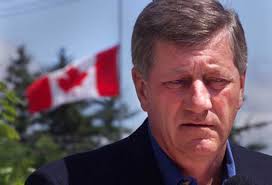 Mike Harris balanced some of his budgets – but was known more for the significant damage done to the province’s education system and reducing the wrong taxes for the wrong reasons. To address this, Ontario could go back to the austerity of the ‘Mike the knife’ days, closing hospitals and laying off nurses; increasing class room sizes and laying off teachers; selling off crown corporations and assets; and deferring essential infrastructure like bridges, highways and public transit. We recall stories of classroom wars, cardiac patients dying in hospital hallways awaiting critical surgery, and tires flying off trucks on our highways during the good old Harris days.
Alternatively we could just let the debt continue to rise until it becomes difficult and costly to borrow any more, blindly mimicking what we witnessed with the Greek economy last year. Or, we could go back to paying our way as we go. We could bring back the kinds of taxation policies which would grow the middle class – the ones which enabled John Robarts to fund Ontario’s high growth in the sixties, without the need to run up deficits and the debt.
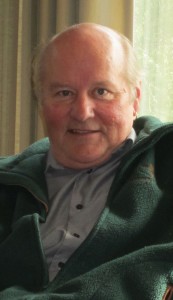 Ray Rivers writes weekly on both federal and provincial politics, applying his more than 25 years as a federal bureaucrat to his thinking. Rivers was a candidate for provincial office in Burlington where he ran against Cam Jackson in 1995, the year Mike Harris and the Common Sense Revolution swept the province. He developed the current policy process for the Ontario Liberal Party. Ray Rivers writes weekly on both federal and provincial politics, applying his more than 25 years as a federal bureaucrat to his thinking. Rivers was a candidate for provincial office in Burlington where he ran against Cam Jackson in 1995, the year Mike Harris and the Common Sense Revolution swept the province. He developed the current policy process for the Ontario Liberal Party.
Background links:
2013 Ontario Budget John Robarts Bill Davis McGuinty and Harris Education in Ontario
Finance Minister’s Address Ontario’s Fiscal History Public Debt Canadian Public Debt

 By Ray Rivers By Ray Rivers
February 14, 2014
BURLINGTON, ON.
If you believe that citizenship is a privilege as well as a right, you might be pleased with the Harper government’s recent initiative making it tougher for immigrants to become Canadians. Indeed there are no good arguments against longer residency requirements for potential citizens. And, discouraging ‘citizens of convenience’ is something we would all agree with. Recall how we had to send a ship to Lebanon to rescue our ‘citizens of convenience’ living there during the last Israeli bombing a few years ago.
 Immigration is what has grown this country – will the new rules fix the mistakes that were made? But Mr. Harper’s plans to strip citizenship from unsavory characters will run into problems with our constitution and possibly our international treaties – not that anyone would object to seeing terrorists deported. Of particular concern is the plan for citizenship to be placed in the hands of the minister, instead of an independent citizenship judge or panel, as it is now. Just another bad idea tempting politicians onto the slippery slope of political corruption.
Canada has always been pretty accepting of immigrants, even before we allowed them to buy their way into the country, a practice which we’ve mostly ended. Other places like New Zealand, which had been the victim of ‘brain drains’ in the 50’s and again the 80‘s welcomes young immigrants who can contribute to its economy. But don’t even think about retiring there as an immigrant, unless you can ante-up with over a million dollars in cash.
On the other hand, Switzerland, always cautious about how immigration might erode Swiss values, has become even more restrictive, recently voting to shut the door to a potential flood of European Union (EU) applicants. And then there is the USA which has talked about immigration reform for the last fifteen years while illegal immigration has made a mockery of government policy. And given the Americans’ perennial legislative gridlock, don’t expect much to change over the next fifteen either.
 Will the aboriginal student population get the services they need to become employable – or are we still in that old Residential School mindset? Another initiative last week came with the announcement that the government will fund efforts to improve aboriginal education. It is disgraceful that those students who do complete secondary school on reserves fail to meet provincial education standards and can’t compete for the better jobs in the labour market. So this is a very welcome and long overdue initiative – one we would have seen in place almost a decade ago had Jack Layton and Stephen Harper not teamed up to bring down the Martin government and kill the Kelowna Accord.
 The last federal budget form Minister of Finance Flaherty didn’t do anything for Ontario. “We were ripped off” said the Ontario Premier. Then this week the Minister of Finance, Jim Flaherty, brought down the federal budget and he might as well have left his old shoes on. While the budget came close to being balanced, it did so by delaying costly Tory programs and promises until after the next election. And some of the spending cuts came on the back of government employees. Salary and pension cuts, while helping bring the budget close to balance, will continue to take its toll on a public service already under performing due to lack of resources, morale and leadership.
Flaherty also cut his own home province’s equalization payment by over $600 million, in an unprecedented action. This is just old fashioned meddling in provincial politics, helping his old friend Hudak. Holding back money due the province, this former MPP is trying to further damage the Liberal government at Queens Park, in advance of a provincial election expected this spring.
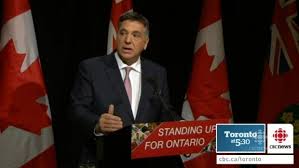 Ontario’s Minister of Finance claims the province was ripped off and short changed by $600 million by the federal government. Premier Wynne held a media conference the next day to complain about the 110 actions the Tories have undertaken to hurt Ontario since they came to power in 2006. Flaherty arrogantly re-announced the Canada Job Grant, which the feds had generously advertised last year regardless that the program didn’t even exist. And since it was supposed to involve the provinces, Ontario wasn’t alone complaining about the absence of any consultation.
This is Mr. Flaherty’s ninth budget and his tamest, given those omnibus bills which have done serious damage to Canada’s environmental assessment process and emasculated its fisheries act. This is probably his last budget as well. Perhaps that is why it is so uninspiring, much like its author, the real Flaherty. I think back to his economic statement in 2008, which nearly brought down the Harper government.
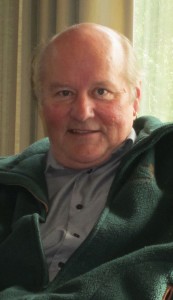 Ray Rivers writes weekly on both federal and provincial politics, applying his more than 25 years as a federal bureaucrat to his thinking. Rivers was a candidate for provincial office in Burlington where he ran against Cam Jackson in 1995, the year Mike Harris and the Common Sense Revolution swept the province. He developed the current policy process for the Ontario Liberal Party. Ray Rivers writes weekly on both federal and provincial politics, applying his more than 25 years as a federal bureaucrat to his thinking. Rivers was a candidate for provincial office in Burlington where he ran against Cam Jackson in 1995, the year Mike Harris and the Common Sense Revolution swept the province. He developed the current policy process for the Ontario Liberal Party.
Background Links:
New Citizenship Rules Current Immigration Rules Citizenship Stripping New Zealand Aboriginal Education
Aboriginal Education Crisis Kelowna Accord

 By Pepper Parr By Pepper Parr
February 13, 2014
BURLINGTON, ON.
Thursday morning – the 13th – it is going to be an exciting day. Canadians are cleaning up at the Olympics, the hockey team will be on the ice at noon and expectations are high.
Burlington’s Standing Committee on Community and Corporate Services will make their Current Budget recommendations which will set the tax rate for 2014 – will it come in at under 10% for the term of this Council? That’s what was promise, rather foolishly made by the Mayor back in 2011.
The residents of two risings in the province go to the polls today – Thornhill and Niagara Falls will vote in by-elections which will determine to some degree when the Premier calls a provincial election. She told this reporter that the provincial election would be “sooner rather than later”.
Move down the food chain into Burlington and where are we? Well the city council incumbents aren’t exactly rushing to the Clerk’s office to file nomination papers. Of the seven to be elected the Mayor is the only person to file papers.
So – what’s going on under the surface? There is some carrier level thinking going on.
The focus is on wards 2 and ward 4. Does Frank McKeown decide to run for office? If he does what office does he run for?
Some early thinking was that he would run in ward 4, perhaps have Jack Dennison, the incumbent, going door to door with him. McKeown would serve four years as a council member and then run against Goldring for the office of Mayor. McKeown had served as Mayor Goldring’s chief of staff for just under two years.
If that scenario were to play out ward 2 councillor Meed Ward would have a very tough go of becoming Mayor in 2018 if she had to run against McKeown.
Well, what if McKeown decided he really didn’t want to serve as a council member for four years and decides to go for the office of Mayor now? He is as qualified as the current Mayor Rick Goldring and he has an excellent working relationship with city manager Jeff Fielding. They both think along the same lines. Not that Goldring doesn’t get along with Fielding – they work well together. McKeown just works better with Fielding.
What would Meed Ward do in that scenario? Well she could decide to run as Mayor now as well and give the city a three-way race for the office of Mayor: Goldring, McKeown and Meed Ward in the ring at the same time.
Meed Ward has very high name recognition – she could give McKeown a run for his money whereas in 2018 McKeown would be well-known.
Were she to lose – and that isn’t a certainty, all she has to do is sit it out for a year and get herself the federal Liberal nomination for the 2015 federal election for Burlington and take out current MP Mike Wallace.
And if you don’t think that’s possible see it this way. A Justin Trudeau sweep, not as big as his Fathers in 1968 but a sweep nevertheless. That would get Marianne Meed Ward into federal politics which I don’t think she would mind at all.

 By Ray Rivers By Ray Rivers
February 6, 2014
BURLINGTON,ON.
There is at least one academic study which claims that increasing the minimum wage would make poverty worse – but the authors note that the result is not statistically significant. And the study is so full-up of assumptions that changing any of them might flip the result. Nevertheless, those opposed to minimum wages hold this up as proof that minimum wages kill jobs and increase poverty, rather than reduce it.
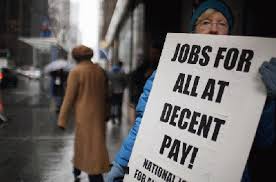 A raise in the minimum wage of 75 cents an hour isn’t going to produce much – $30 a week at best. Those who support increasing minimum wages disagree and produce their own studies to show a host of benefits. The President of the United States is apparently in that camp and so is Ontario’s Premier. Taking her cue from the Ontario Minimum Wage Advisory Panel, which she appointed last year, she has raised the provincial minimum wage and tied its future to the cost of living. And, she has credibility on her side, since the provincial Liberals’ poverty reduction strategy claims to have lifted almost 50,000 children out of poverty between 2008 and 2011.
 Still, less than ten percent of Ontario’s labour force work for a minimum wage, about half a million workers. And not all those living below the poverty line are employed, so it will take more than raising minimum wages, if solving the poverty problem is our end goal. Raising the income and dignity of those whose only choice is to accept a low-paid job is an important outcome, however, for a government which cares about all residents and not just the well-off. However, eliminating poverty would require a more substantial initiative, including revamping our tax system and some leadership by the federal government. Still, less than ten percent of Ontario’s labour force work for a minimum wage, about half a million workers. And not all those living below the poverty line are employed, so it will take more than raising minimum wages, if solving the poverty problem is our end goal. Raising the income and dignity of those whose only choice is to accept a low-paid job is an important outcome, however, for a government which cares about all residents and not just the well-off. However, eliminating poverty would require a more substantial initiative, including revamping our tax system and some leadership by the federal government.
In the 1970‘s both Canada and US ran pilot projects testing something called a ‘negative income tax’ or ‘guaranteed annual income (GAI)’. The idea was to ensure everyone received a livable income from their work, or would be matched with a government grant if they didn’t. Don’t be alarmed, this concept is somewhat comparable to the existing HST rebate, which goes to lower-income households. The Canadian pilot projects were aborted before the results could be fully evaluated, victims of unusually high unemployment rates, high budgetary deficits and newly elected Conservative governments eager to uproot socialism.
Some of the early results indicated that there would be only a modest impact on labour markets but significant changes to how people use their time – mothers doing more child care, greater family leisure time and enhanced educational activity. Demographics have changed considerably since the 70‘s so the results may not be very useful for implementation today, even were today’s conservatives willing to overlook their oft-recited Protestant creed – ‘the Lord helps them who help themselves’.
 But not all conservatives are spooked by innovative approaches to eliminating poverty. Senator Hugh Segal is a proponent for GAI and argues that such a plan could be funded entirely from the resources being poured into the existing patchwork of poverty reduction programs. In addition, existing welfare programs perversely discourage recipients from looking for work, while GAI would encourage them to top-up their incomes by accepting low paid work – at least until better opportunities come available. But not all conservatives are spooked by innovative approaches to eliminating poverty. Senator Hugh Segal is a proponent for GAI and argues that such a plan could be funded entirely from the resources being poured into the existing patchwork of poverty reduction programs. In addition, existing welfare programs perversely discourage recipients from looking for work, while GAI would encourage them to top-up their incomes by accepting low paid work – at least until better opportunities come available.
Hugh Segal has spent most of his working life as a Progressive Conservative in some capacity or other, including senior aide and chief of staff for Premier Bill Davis and PM Brian Mulroney, and seeking public office himself. He was appointed to the Senate by Liberal PM Paul Martin in a rare moment of non-partisanship, as if Martin was somehow anticipating Justin Trudeau’s recently articulated appointment policy.
But Senator Segal is very much a voice in the wilderness on this issue among the political movers and shakers. Though he may not be too far ahead of the general public, which recent polling shows is becoming interested in, and supportive of, the concept of a guaranteed annual income. Still no political leader seems to have made this a priority. In the meantime I guess we’ll have to settle for Premier Wynne’s inflation-proof minimum wage.
While on this topic I don’t understand why today’s wait-staff (liquor servers) get treated like something out of a Dickens novel. Their minimum wages are set conservatively at about a dollar less than that of other eligible workers, making them reliant on the archaic practice of begging for tips -‘To Insure Prompt Service’. In New Zealand, for example, tipping is infrequent and unexpected because the restaurants there pay their staff decent wages up-front. Even here, some restaurants slap on a mandatory service charge, which presumably goes to the wait-staff and avoids that annoying tipping.
Wouldn’t it be nice if the next time that attractive person waiting on your table flashes those big brown eyes, you know it’s because he, or she, is interested in something other than what’s in your wallet.
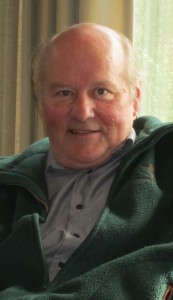 Ray Rivers writes weekly on both federal and provincial politics, applying his more than 25 years as a federal bureaucrat to his thinking. Rivers was a candidate for provincial office in Burlington where he ran against Cam Jackson in 1995, the year Mike Harris and the Common Sense Revolution swept the province. He developed the current policy process for the Ontario Liberal Party. Ray Rivers writes weekly on both federal and provincial politics, applying his more than 25 years as a federal bureaucrat to his thinking. Rivers was a candidate for provincial office in Burlington where he ran against Cam Jackson in 1995, the year Mike Harris and the Common Sense Revolution swept the province. He developed the current policy process for the Ontario Liberal Party.
Background links:
Minimum Wages Study
Policy Alternatives Study
Forbes View
Globe and Mail View
Financial Post View
US Minimum Wage
Minimum Wage Advisory
Canada’s Minimum Wages
Star View
Ontario’s Poverty Reduction
Canada’s Poverty
Guaranteed Annual Income
Poll on GAI
Wait Staff
Hugh Segal

 By Pepper Parr By Pepper Parr
February 4, 2014
BURLINGTON, ON.
This is a little awkward. How does one write about a person they have never met, who is no longer alive and who is being recommended for a level of recognition few in the city ever receive?
The Halton Regional Police Association have recommended that Bill Henshaw be recognized for his police service by having the street the Burlington police detachment station is on re-named and called Constable Henshaw Boulevard.
They have asked city council to rename Southampton Boulevard, a street that has no residence and serves as the entrance into Headon community that is west of Walkers Line and south of Dundas.
According to city planner Bruce Krushelnicki this has been done just once before in Burlington.
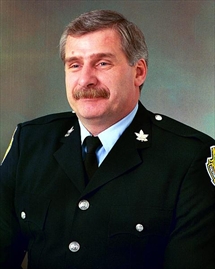 William Charles Henshaw Charles William Henshaw was also current Chief of Police Steve Tanner’s training officer. His colleague Pail Lacourse, Chief Administrative Officer of the Police Association told Council that Henshaw “didn’t aspire to be promoted” – he was a front line officer with a soft spot.
Constable Leslie Bayliss served with Henshaw and told of a Christmas Even in 1999 when a lovelorn American drove up from Buffalo to meet the woman he hoped to marry but had never met. Bayliss described that night this way. The man knocked on the woman’s door, she took one look at him and shut the door in his face. The man didn’t know what to do and he had a problem – there wasn’t enough gas in the tank of his car to get him back to Buffalo. He asked the police for help and Constable Henshaw used his credit card to put gas in the man’s car.
That story says more about the woman who slammed the door and the man who knocked on it than anything else. Does it say enough about a man the police want to have recognized?
Many ask why not name the park to the south of the police station after Henshaw? Much was made of the comments from the delegations but no reference to the letter that was part of the Standing Committee agenda from a resident that did not think the street should be renamed.
The staff report did make reference to the fact that most of the residents that were aware of the idea of renaming the street were opposed.
Councillor Lancaster, who was chairing the meeting, put on her best Miss Canada smiled and said she was proud to move the motion to rename the street after the police Constable. And it was a nice thing to do. Is it the right thing to do?
Councillor has a practice of ignoring what her constituents have to say.
When the city hands out its Burlington’s Best awards later this year – is the focus not on the “best”? We do not take anything away from Constable Henshaw – he appears to have been a fine police officer who died far too young. The man is not the issue – it is the policy and the way the residents who will be inconvenienced for some time by a street name that is the concern.
One resident wrote saying “I have been a resident of this area for more than 20 years and the residential area was established long before the police station was built on Southampton Blvd. Changing the name of a long existing street is confusing an inappropriate for the residents of the area.”
Another 45 year Burlington resident was “disappointed” that the Halton Regional Police Association is requesting that Southampton Boulevard’s name be changed. “I have never heard of Constable Bill and cannot understand any significant local reason for renaming a street after him.”
The resident felt that renaming Newport Park to the south of the police station would be more appropriate.
The Police Services Board sent council a letter asking that “a well-respected, long serving member of the Halton Regional Police Service who died while on duty” be recognized with something that would be “most fitting to honour his service to the community”.
Councillor Dennison had no problems with the idea but he did want to see a sign placed beneath the new street name sign saying “Formerly Southampton Blvd” and kept in place for at least 24 months. His amendment was accepted.
It wold be interesting to see the data on just what residents had to say. This Council wanted to go along with a police association request that was brought to council by its Police Services Board representative Councillor Craven.
A lovely idea – but it is an appropriate one?
Background links:
Bill Henshaw – a cop who worked his beat.

 By Vanessa Warren By Vanessa Warren
January 30, 2014
BURLINGTON, ON
An open letter to the LaSalle Park Marina Association (LPMA),
Last night I attended a public Consultation Meeting and Workshop for the City of Burlington’s 2014 budget.
 Vanessa Warren on the right reading through the city budget workbook at a public consultation last night took exception the way the LaSalle Park Marina association tried to hijack the meeting. Ken Woodruff, former Burlington Green president, is on the left. Full disclosure: I am a farmer in Burlington’s rural north, sit on the board of Burlington Green, and Chair the Rural Burlington Greenbelt Coalition. I had never attended a workshop like this before and to be sure, what got me off the couch and to the meeting was a desire to see that public transit, environmental sustainability and rural issues were being represented within the context of the City’s financial plan; but I also attended because I feel we all have a civic duty to ensure our municipality’s house is in order.
I prescribe to the belief that I cannot ask my government to be accountable to me, if I do not engage with them.
Upon arrival, an encouragingly large group of attendees were put into working groups around large tables, and instructed as to the evening’s ‘feedback’process. We were then given an opportunity to ask questions, and the first two or three queries from the group were salient, intelligent and budget-related; but when John Birch, president of the LaSalle Park Marina Association stood up, it quickly became clear that the meeting had been hijacked.
Some background. The wealthy boat owners at the LPMA, led by rhetorician John Birch, would like to expand their private harbor, currently occupying the waterfront of a public park and further, want the city to provide more funds beyond the $150,000 already given to them to start detailed designs before the environmental assessment challenge is resolved. The crux of the issue, as I and many others see it, is that the desired construction will almost certainly destroy the wintering grounds of 1/4 of Ontario’s Trumpeter Swan population; a population that has been crawling back from the brink of extinction. I would, and have, also publicly argued that there is no demonstrated need for this redundancy particularly in the face of the City’s fiscal concerns, and with a great deal more environmental assessment to come.
However, regardless of your position on the project IT WAS NOT AN AGENDA ITEM at this budget meeting. The LaSalle Park Marina Expansion is not even being considered in the 2014 budget, and yet, the LPMA thought it appropriate to use the workshop as an illegitimate soapbox for its cause.
Many, many people, citizens, City staff, and almost the entire City Council (with the exception of Councillor Blair Lancaster), devoted their time last night to be engaged in the messy process that is democracy. The workshop was well-attended, well-organized, and should have been much more fruitful; instead, we spent a devastating amount of utterly useless time being commandeered by a special interest group railroading a non-budgetary issue.
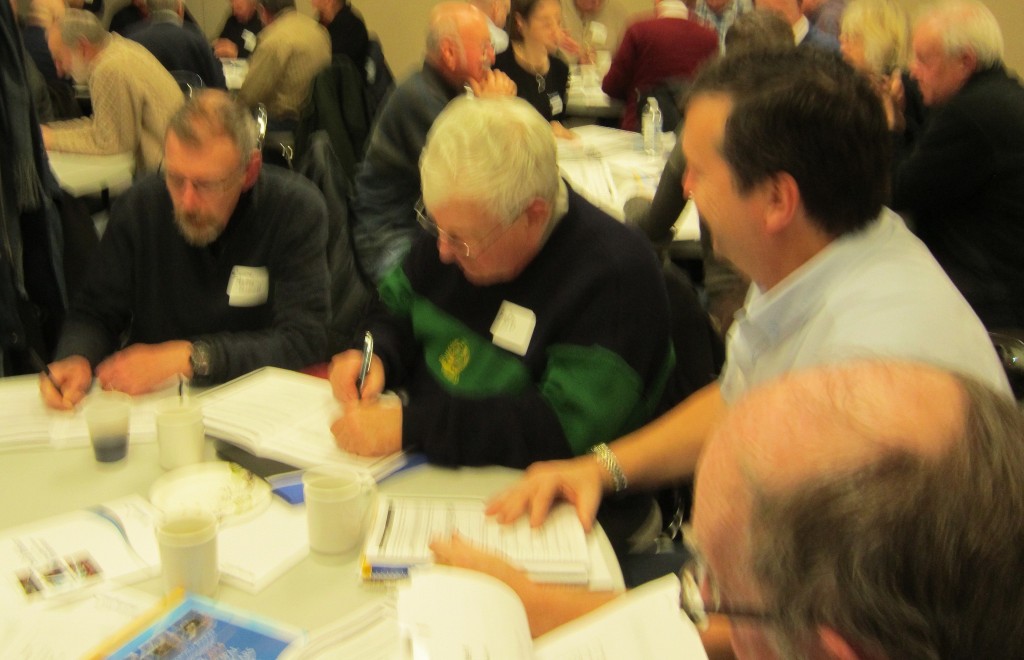 John Birch of the LaSalle Park Marina Association, on the left, going through his workbook. John Birch and the LPMA: I find your case for public funding of a private marina totally without merit. However, if you believe it to have merit, and as a “joint venture”of the City of Burlington, then you must follow the public process as it has been laid out. Your project already hangs by a thread of legitimacy, and if you truly believe your cause is just, then you should promote it justly. Engage with the community and your council where appropriate, and where people who have a counterpoint may enter the dialogue as well. The guerilla tactics that you used so disrespectfully last night were disruptive and unprofessional, and from my perspective, only further eroded your project’s credibility.


By Ray Rivers
January 30, 2014
BURLINGTON, ON.
Last week two passengers flying from Toronto to Halifax got carried away and joined the Mile High Club (MHC). On landing the police detained them, and the female ended up getting arrested – which as you can imagine would kind of ruin the moment. Perhaps the most celebrated case of making your own in-flight entertainment was Ralph Fiennes and a very eager-to-please attendant, on route to Bombay from Darwin. Australia. Somebody caught her fixing her skirt as she left the toilet cubicle shortly after Fiennes did.
 Part of the growing up stages? These are the stories of fancy – how many of us secretly wish it were us? And seriously, why would they arrest somebody for doing what comes naturally, providing it was in the confines of a plane’s tiny toilet compartment or discretely in one of those horribly uncomfortable seats. Perhaps the lucky couple should qualify for a medal for having the chutzpah to engage in that kind of near-gymnastic activity, rather than being arrested. Maybe this could be another Olympic event?
Anything to escape from the boredom of listening to those whining jet engines and that annoying intercom. Richard Branson once bragged that he got initiated into the MHC at a very young age – but then what would you expect from a guy who named his airline ‘Virgin’? I once saw an advert for an hour-long MHC private flight for under $500, and our own Justin Bieber reportedly has joined the club, though the HIGH may be just the kind one gets from smoking Rob Ford’s favourite herb.
Then there is the other mile-high club – the one where Canada’s prime minister flies hundreds of business people to foreign lands to expand Canada’s trade opportunities. Jean Chretien first created the Team Canada concept. And last week Stephen Harper flew 200 people to Israel. though I’m not sure why, since we already have a free trade deal with them – one Chretien negotiated back in the 90’s. And our business with that tiny nation will only ever amount to a mere fraction of our total exports.
So what was Harper doing in Israel and why did he bring over so many delegates? The fact is that this excursion wasn’t about trade, it was about politics. Harper apparently believes that if you profess your love enough times you’ll get loved in return. Though, it’s really the votes he wants – enough to give him another ten or so ridings in vote-rich Ontario.
Is it working? The pollsters and pundits will tell you it is, but my friends of Jewish background always seem more insulted than impressed with this kind of deliberate over-the-top pandering. After all, the PM’s love extends shamelessly to any minority group which can return his love at the ballot box. We recall how he performed a masterful grandstand for the Tamil community, refusing to attend an annual commonwealth meeting in Sri Lanka last year.
And there is never a shortage of client groups to love. The recent Ukrainian disturbance, for example, has provided him with a plum opportunity to play up to Canadians of Ukrainian origin. For Mr. Harper and his party all politics is local – and Canada’s foreign policy gets determined by what will win votes back home. That isn’t new and he isn’t the first politician to play politics with international relations, but Harper has turned this kind of pandering into a new art form.
In one of his speeches he talked about Canada’s unquestioning support for Israel as being the right thing to do. But is it? The roadmap to the future for Israel and the Palestinians is either a two-state solution or a one-state solution. Of course a form of occupied single-state is what they have right now. But this situation is unsustainable – a time bomb ticking until violence once again brings chaos and calamity to this part of the middle east.
 Close to 200 people trekked to Israel with the Prime Minister – the public paid for a lot of those airplane seats. And time is also against a two-state solution, which is partly our fault, since Canada’s international posture has helped mitigate against that outcome. John Baird voted against a Palestinian state at the UN and we intervened at the G8 to avoid criticizing Israel’s occupation beyond the 1967 borders. Our recent role in the Middle East has helped enable Israel to flaunt international law, including construction of a barrier through occupied territory, violating UN resolutions and creating new settlements in the occupied territories.
Stephen Harper may claim he is doing the right thing – but his unquestioning support for the status quo in that nation is wrong. While his motives may be genuine, this is not the kind of love that Israel needs. If there is no two-state solution there will be a one-state solution and that will mean the end of the Jewish nation. Israel will not be able to avoid integrating its Palestinian population into an evolved secular democratic state. South Africa, Israel’s one time ally, can provide a working blueprint of how to proceed.
Being a mile above the earth is supposed to provide greater perspective, but our PM was missing the big picture as he and the rest of his 200 mile-high delegates flew in to Israel last week. Just like that couple on the flight to Halifax he is confusing passion for love. What they were doing may have felt like love but it was really just going through a motion.
 Ray Rivers writes weekly on both federal and provincial politics, applying his more than 25 years as a federal bureaucrat to his thinking. Rivers was a candidate for provincial office in Burlington where he ran against Cam Jackson in 1995, the year Mike Harris and the Common Sense Revolution swept the province. He developed the current policy process for the Ontario Liberal Party. Ray Rivers writes weekly on both federal and provincial politics, applying his more than 25 years as a federal bureaucrat to his thinking. Rivers was a candidate for provincial office in Burlington where he ran against Cam Jackson in 1995, the year Mike Harris and the Common Sense Revolution swept the province. He developed the current policy process for the Ontario Liberal Party.
Background links:
Stephen Harper and Israel
A Matter of Principle
Jewish Voters
Harper’s Zeal
Mile High Club
Justin Bieber
Halifax Flight
Two State solution

 By Pepper Parr By Pepper Parr
BURLINGTON, ON.
January 23, 2014
How did he do this time?
It really wasn’t all that different than the last two State of the City addresses the Mayor has delivered. I think he thanked everyone who pays taxes.
He introduced everyone that was elected and is paid by the taxpayers then chose to pass up on a chance to ask Burlington MPP Jane McKenna if she would talk to the Ministry of the Environment about the water table testing needed due to the tens of thousands of tonnes of landfill from God knows where that was dumped on the land without site plan approval.
At the same time he could have asked for some help from the Ministry of Transport on the road work that has to be done to keep IKEA in town.
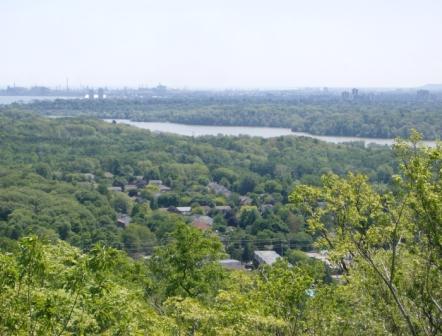 15 hectares (37.2 acres) of land in North Aldershot that was donated by Mr. John Holland and will become part of the Cootes to Escarpment park system. It was more polished speech this year, someone spent some time on giving the document more than a once over, but it didn’t move people. People basically sat on their hands. When John Holland got thanked for the 37 acres of land he donated to the city he got a great round of applause.
The address ran 13 pages long, hardly a laugh in it – it was basically an update of where we are which I guess is what a State of the city is supposed to be – but there are some concerns – real concerns that weren’t even touched on.
The city recently re-built a stretch of Goodram from Spruce south to Lakeshore – at a cost of $2.9 million. There are 54 homes in that stretch of the city.
At some point every street in the city is going to have to be re-built – that’s just the nature of infrastructure. The cost of re-building just a portion of Goodram is not sustainable. We need to find a different more sustainable way to pay for the work that has to be done.
Mention was made about the Economic Development Corporation. The audience for this address by the Mayor was brought in by the Chamber of Commerce – these are the business leaders of the city and they are heavily represented on the Economic Development Corporation – which is in very serious trouble.
We keep sugar-coating the problems with the BEDC. It was evident two years ago that the Executive Director had to go – but heels were dragged, excuses given (one was that the city couldn’t afford to buy the guy out)– but when they did eventually part ways the Chair of the BEDC made some intemperate remarks that cost the city a couple of thousand extra in the severance package.
We are told that a new “business model” will be revealed at the BEDC’s AGM in May. The hope at BEDC right now is that they get the $275,000 they’ve asked for to do yet another study. Meanwhile the city’s Industrial Commercial Institutional tax revenue is less in 2013 than it was for 2012 and is projected to be less again in 2014
 Something is brewing between the city and the University campus on the South Service Road. Mayor wasn’t ready to let that cat out of the bag this morning. There is some good news – has to do with some project development with the McMaster Burlington DeGroote campus on the South Service Road. The Mayor kept that card close to his chest – perhaps it will be an election campaign announcement although any credit will be due to the sterling work being done by the city manager.
Burlington’s relationship with the university has been mixed a best. The city got stiffed when McMaster pulled their plans for a campus on what is now the Elizabeth Street parking lot.
Mayor Goldring spoke of all the new jobs – but made no mention of those we lost and we lost some good ones. DependableIT is moving to Hamilton – they couldn’t find the space they needed in the city and apparently no one at BEDC was talking to them.
Dependable IT is –just what they say they are – working in Information Technology support. Their first two clients were Rogers and Cogeco. Dependable doesn’t flip hamburgers; they pay good wages and those dollars are on their way to Hamilton..
Property values are increasing. The Mayor said the average price of a home at $500,000 while the Finance Department has it at the $450,000 plus –and he said prices increased 7% over 2012. The people in the Beachway would certainly like to see some of that value accrue to their homes.
We managed to keep IKEA in town – not much mention of just what that is going to cost the city. Rebuilding the Walkers Line/North Service road interchange is going to cost a big bundle and the province didn’t get the least bit generous with funds.
The Infrastructure and Development people have had to make the best of a bad situation – anyone who drives the North Service Road west of Walkers Line will scratch their heads when they think about how many cars are going to drive along that road – it’s just two lanes wide now.
When it was all over and the tables were being cleaned up I chatted with a few people to get some feedback. No one was inspired – Ho hum summed up what I heard. As drove back to my office I thought about what moved me – and realized it was the reference made to John Holland and his donation of 37 acres of property in remembrance of his wife Eileen.
The applause was sustained, it was genuine, it was real; far more than just polite. We had just heard a Burlington story. As I thought about that bright spark – it was the only one, I realized that Mayor Goldring isn’t comfortable getting beyond the numbers. XXX number of jobs; XXX square feet of new commercial development; XXX new jobs.
These were kisses without hugs. That’s not what makes a city, that’s what makes a living but surely living is beyond numbers? There was no emotion – it was pretty bland.
While the program said there would be some Q&A – that seemed to get dropped.
Disappointing? Kind of – but more worrying is that we are in an election year and we have to decide if we want to keep the leadership we have. The Mayor has filed his nomination papers and so far he is the only person seeking the office of Mayor.
Now if I were a betting man I would find myself wondering how many other people came away feeling the way I did and was there anyone who wondered to themselves – I can do better than that.
It is pretty common knowledge that Ward 2 Councillor Marianne Meed Ward wants at shot at the office – did she hear enough to convince her to take a run at the brass ring in 2014 because the competition in 2018 will be pretty stiff?
Is the dark horse ward 4 candidate wondering if he shouldn’t just go for the Mayor’s job now?
Is Paul Sharman, who filed nomination papers as a Mayoralty candidate in 2010, and then pulled them to instead run for the ward 5 council seat Goldring was going to vacate? Does Sharman think he can do a better job?
It wasn’t a pathetic speech – but it just wasn’t good enough. After three years in office the people at the Burlington Convention Centre deserved better – and needed better.
“Council unanimously approved the Revised Core Commitment for downtown”, said the Mayor. “With over 1800 touch points from our public consultation process, came the vision “Creating an active waterfront downtown destination that showcases the cultural heart of Burlington.” The City will play a leadership role in setting policy and committing resources to implement the strategic actions required to create a more vibrant and prosperous downtown. I have often stated that I believe that our downtown is the heart and soul of our community.”
We are in trouble in the downtown core is the heart and soul of the community.
For reasons that I can’t explain Rick Goldring isn’t comfortable with himself. He won’t tell the incredibly human stories that are in him. I would have loved to hear him tell about the picture exhibit Don Smith put up at the Performing Arts Centre just before the publication of the book he sponsored that told a good part of the Burlington story. Goldring found himself tearing up at that event.
I wanted my Mayor to “romance the stone” to make me feel proud of why I am here and move me to want to get involved and make this place even better than it is.
I don’t know why I didn’t hear that – I just heard a lot of platitudes.
Background links:
Full text of Mayors 2013 State of the City address

 By Pepper Parr By Pepper Parr
BURLINGTON, ON.
January 23, 2014
Hopes ride high in the minds of many that the 20 year incumbent will take the hint and move on. Jack Dennison, who is as sly as the best of them has his game plan figured out and he will do what is best for him when the time comes. Dennison knows better than most how to handle a fluid situation.
There is a future Mayor waiting in the wings and a past Citizen of the year trying to determine when best to throw his hat in the ring. Brian Heagle, Burlington lawyer and past candidate who did rather well last time out doesn’t admit that he will run – but wowser – is he ever good at trashing any candidate that comes forward.
 John Sweeny – Brian Heagle’s favourite nobody – filed his nomination papers for the ward 4 council seat. Heagle will be seen at the Clerk’s office very soon John Sweeny filed his nomination papers earlier in the week – and before you could say Jack Spratt – Heagle was all over him like the basketball player he used to be.
Check out the dissing Heagle gave the guy.
While the incumbent, Jack Dennison, waits silently until June to announce if he’ll seek re-election – Mr. Sweeny is off and running as of yesterday.
Heagle tells his blog readers that Sweeny is in the race and then asks if Sweeny will he make any noise and be heard over the din of a likely Provincial election this spring?
While Heagle isn’t Sweeny’s campaign manager he is certainly telling his readers more than Sweeny is saying about himself.
1) PERSONAL. Mr. Sweeny has lived in Burlington his “entire life” and also has “a passion for the City“. Hockey and sailing are enthusiasms.
2) CAREER. He’s worked for employers in different places in the “High Technology” sector, primarily as an “Alliance and Channels” expert.
However, after more than 13 years, he no longer works in downtown Toronto with Deloitte. That job ended a few months ago.
3) REASONS / PLATFORM. In effect, this candidate is applying for a new job, and a career change. Why at City Hall?
A Councillor doesn’t commute to work. Knowing Mr. Sweeny worked in downtown Toronto, it’s understandable to want a lifestyle change! But what are his most substantive reasons? Is it due to recent circumstances, or a long-term desire to run for public office?
More importantly, what applicable skills and community experience would Mr. Sweeny bring to Council? How truly connected is he to our City, and Ward 4?
There’s nothing about supporting or volunteering for local groups (other than coaching hockey), nor anything about past leadership roles in the community.
I’m sure those essential details will follow in due course at the door, plus in a campaign website and pamphlets.
4) PROFILE. Do you know him? Ever heard of him before reading this blog post?
I’ve already exchanged emails/calls with Ward 4 residents about Mr. Sweeny. I don’t know him. I’ve never heard of him. That’s apparently true for everyone who’s contacted me so far, including several of his neighbours in Roseland.
Such anecdotes are not encouraging for name recognition, nor for someone looking to gain trust and get votes.
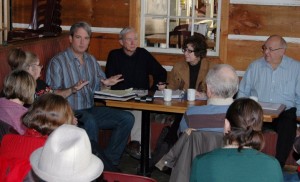 There was a time when the late John Boich truly believed that Brian Heagle was his dream come true – a candidate that could win the provincial seat for the Liberals. Boich sits on the right watching “his boy” work the small group. Heagle thought better things were out there for himself if he ran as a Tory – but the Tories didn’t want him Wow – the gloves may not be off but you kind of know they are going to come off at some point soon. Heagle has always wanted the Ward 4 seat and isn’t at all pleased that someone else has decided to jump into the sandbox.
Stand by –this is going to get better.
Background links:
Horses are getting into the gate for municipal election race.
Candidate falls on his sword.
Heagle decides to contemplate.

 By Ray Rivers By Ray Rivers
BURLINGTON, ON.
January 23, 2014
In Ray Bradbury’s 1953 dystopian novel, 451 Degrees Fahrenheit, The main character is a civil servant (fireman) whose job is to eradicate literature and other culture, and those who harbour it. Facts can complicate policy, and scientific knowledge can get in the way of pursuing policies for a government determined that it already knows all the answers. Bradbury’s novel is a cautionary tale for a society subject to the whims of leaders more persuaded by dogma than reality.
 The federal government isn’t burning books – they just put them in places where you can’t get at them. Joseph McCarthy’s House Un-American Activities Commission and Nazi Germany’s infamous 1930’s open-air book burnings were the inspiration for Bradbury’s novel. The act of destroying books is called biblioclasm or libricide, regardless the nature of the destruction. This is hardly a new phenomenon since history dates an early book burning back to the 7th century BC when the King of Judah, Jehoiakim, burned the prophet Jeremiah’s biblical scroll.
 Calgary journalist Chris Turner has written a book, ‘The War on Science’, which documents Stephen Harper’s attack on basic science, science communication, environmental regulations, and the environmental NGO community. Turner claims this is the most vicious assault ever waged by a Canadian government on the fundamental principles of the Enlightenment. And indeed, we have never seen anything like this before. Calgary journalist Chris Turner has written a book, ‘The War on Science’, which documents Stephen Harper’s attack on basic science, science communication, environmental regulations, and the environmental NGO community. Turner claims this is the most vicious assault ever waged by a Canadian government on the fundamental principles of the Enlightenment. And indeed, we have never seen anything like this before.
Turner highlights how the government closed Arctic research stations as oil drilling began in the high Arctic, presumably to hide the effects of that activity on the environment. He notes how research budgets were slashed in agriculture, enabling industry to monopolize our food health and safety. He points out how the nation’s fisheries policy has been turned on its head in order to accommodate development which normally would have been prohibited over concerns about fish habitat and water quality.
Since becoming PM, Mr. Harper has dismissed over 2000 scientists and muzzled those who remain. Media have been confounded in trying to understand complex environmental, and other scientific, issues in the absence of the government experts they had come to rely upon. Indeed, the long tradition of independence of the science community has been brought to an end by a government that prefers to hear what it wants, rather than the truth as it is – bringing to modern life, one day, the Hans Cristian Andersen fable of the Emperor and his new clothes.
Then there are the science libraries being closed – seven out of eleven aquatic research regional libraries, housing decades of irreplaceable information about our waterways and the oceans, have been shuttered. The Department of Fisheries and Oceans (DFO) spokespeople claim that vital documents are being converted onto electronic format, but the research scientists are crying foul as they watch so many studies being pitched and destroyed. I have nightmares of my writings from my work with DFO being used as kindling for the fires.
 The first census. Even in the time of William the Conqueror they understood that data was relevant. Not the view of the Harper government. I suppose we might have seen this coming. After all, the federal government abandoned the detailed census (long form) a couple of years ago making inter-temporal census tract and other comparisons difficult, if not impossible. I always understood census information to be a key function of government – at least since William the Conqueror pioneered data collection, in 1086, with his assembly of the Domesday book. I relied extensively on census data in some of my research work, and I would have thought Mr. Harper did as well in his earlier life.
The cost of keeping the library records alive is estimated at less than a half-million dollars, which is peanuts for a government happy to spend over $2 million advertising a job training program which doesn’t even exist. And it really pales in comparison to the $40 million annually spent promoting the oil sands. Sorry, but why are we advertising for the oil companies? Clearly then, the decision to eliminate our store of scientific knowledge is not about the cost. It must be about what Bradbury, Orwell and other enlightened authors were trying to tell us.
Stephen Harper came to office with a goal to transform Canadian society, and he has re-shaped much Canadian public policy since winning a majority of Commons seats. He has the mandate, and while I disagree with him on much of what he is doing, I do not deny him the right to exercise his will as Prime Minister and leader of the governing party. But I never thought he was going to take aim at science and knowledge, the very areas Harper himself claims will provide Canada a profitable and sustainable future.
As I write this column Mr. Harper is in Israel. I can’t but be struck by the irony of his affection for the Jewish people, who suffered through their own period of book destruction, as he shuts down our libraries and trashes our own scientific history. In the words of the beloved and insightful German-Jewish poet Heinrich Heine, from his 1821 play, Almansor,- “Dort, wo man Bücher verbrennt, verbrennt man am Ende auch Menschen”: “Where they burn books, they will also ultimately burn people.”
 Ray Rivers writes weekly on both federal and provincial politics, applying his more than 25 years as a federal bureaucrat to his thinking. Rivers was a candidate for provincial office in Burlington where he ran against Cam Jackson in 1995, the year Mike Harris and the Common Sense Revolution swept the province. He developed the current policy process for the Ontario Liberal Party. Ray Rivers writes weekly on both federal and provincial politics, applying his more than 25 years as a federal bureaucrat to his thinking. Rivers was a candidate for provincial office in Burlington where he ran against Cam Jackson in 1995, the year Mike Harris and the Common Sense Revolution swept the province. He developed the current policy process for the Ontario Liberal Party.
Background links:
Fahrenheit 451 Book Burning Fisheries libraries The Census Harper Reshapes Canada
Long form Census Domesday Book Canadian Science Libraries War on Science 2

 By Ray Rivers By Ray Rivers
BURLINGTON, ON.
January 17th, 2014
February 13th Ontario electors in Thornhill and Niagara Falls will head to the polls. Thornhill Tory MPP Peter Shurman resigned over expense claims and Liberal maverick MPP Kim Craitor hung up his gun belt late last year. Premier Wynne led off the campaigns promising a new hospital for Niagara. The NDP’s Horwath seems to be hiding, waiting for public input. But Tory opposition leader Hudak has rolled out a bold new policy called the Million Jobs Act. That is a million jobs created over the next eight years. Yes, eight years.
 His strategy begins by cutting corporate taxes to 10 percent, the level former Premier McGuinty was targeting before Andrea Horwath and minority government stopped him. Still, at 11.5% today Ontario has one of the lowest rates in the country. When federal and provincial rates are combined, total corporate taxes in Ontario are well below those in the US. So why is this so important? When you cut taxes, you cut revenues and that means your deficit increases. And as far as job creation driven by tax cuts – that disproven, revisionist, ’Reagan era’ piece of voodoo economics is not supported by any credible economist, anywhere. His strategy begins by cutting corporate taxes to 10 percent, the level former Premier McGuinty was targeting before Andrea Horwath and minority government stopped him. Still, at 11.5% today Ontario has one of the lowest rates in the country. When federal and provincial rates are combined, total corporate taxes in Ontario are well below those in the US. So why is this so important? When you cut taxes, you cut revenues and that means your deficit increases. And as far as job creation driven by tax cuts – that disproven, revisionist, ’Reagan era’ piece of voodoo economics is not supported by any credible economist, anywhere.
 Ontario hasn’t managed – yet – to make the renewable energy sector really come alive – but they are going in the right direction. Hudak further disappoints by echoing the misinformation being churned out by Ontario’s right-wing dailies, blaming the tiny renewable energy sector for Ontario’s high energy costs. As I pointed out in my Dec 14th column, energy rates are high, and getting higher, in large part because Harris and Eves fumbled deregulation and privatization, back when Hudak was a member of their Tory caucus. Was he sleeping and missed it or is he just being disingenuous? It’s not McGuinty’s renewable energy policy but his government’s inability to fix the system that is costing us.
Hudak’s million jobs legislation would bring Ontario into the ‘New West Partnership’, a deal currently among British Columbia, Alberta and Saskatchewan to eliminate trade barriers. It is hard to understand why we Canadians can conclude all those international free-trade deals yet we don’t even have free-trade among ourselves. Wouldn’t it be nice to see one of those excellent BC wines in the LCBO? This is no-brainer policy, and a good one, but it will hardly get us to a million jobs.
Hudak has promised to freeze civil service wages, a reasonable position for a government in deficit, though he appears soft on continuing Harris-era management bonuses, which the Liberals have frozen. Picking on the civil service unions is a key part of his greater strategy – to de-unionized Ontario – turning the province into one of those Tea Party ‘right-to-work’ places he admires south of the border? If freezing civil servant wages doesn’t give him the labour war he wants, then eliminating thousands of education jobs sure will.
To his credit, there is some evidence that high levels of unionization may retard employment growth and, perhaps, even productivity. Unions are a barrier to labour mobility, after all. But trade unions also complement the human relations responsibilities of management – so it depends on what you are measuring. For example, most skilled trade guilds have qualifications criteria and experience as a screening pre-requisite for membership. And unions often form the backbone of workplace committees on health and safety, anti-harassment, conduct and discipline – all of which lighten the load of management and often reinforce normal management actions.
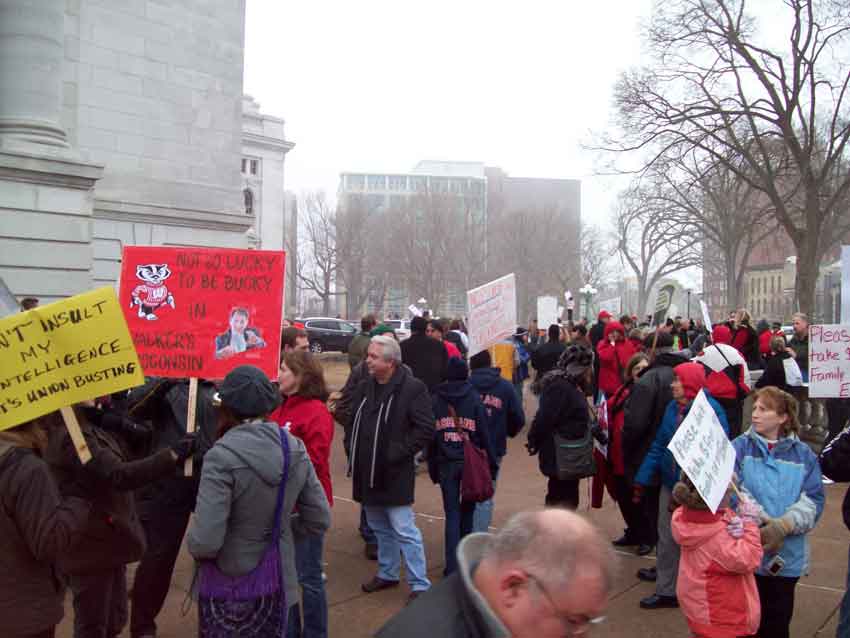 Union busting: Let’s not forget that the labour movement and progressive taxation is what created the once powerful middle class in our society. Unions’ bargaining power shifted more of the returns from production to labour, putting more money into pay packets which enabled greater consumption by the middle class and spurred economic growth. In addition, the mere existence of large unions helped pull up the incomes of non-unionized workers, the ’free-riders’, particularly when labour markets were tight. It is a complicated issue with potentially serious repercussions for hasty, thoughtless ideologically driven action.
It is no coincidence that the drop in union numbers over the last several decades has been accompanied by an increasing spread in income and wealth between the richest and the rest of us. Without the unions’ collective agreements, progressive governments would be forced to increase minimum wages to well beyond where they are today. And governments of all stripes would need to exercise greater regulatory oversight over workplaces and workplace rules, meaning more, not less, red tape for the business community.
The Million Dollar Jobs plan is really a little bit of good, some bad and a lot of ugly. And even spread over eight years there is no way that Mr. Hudak will see anything like a million jobs from his proposed legislation. Still, it is a catchy piece of marketing which may well attract voters to the PCs in the by-elections — even if it is mostly nonsense.
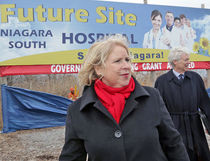 If you want you to know they really care – they will spend some of your money on you. Burlington knows all about that stuff – we got our hospital didn’t we? We will know better as the campaigns unfold. The NDP has to decide if they want to stick their necks out and if so how far and perhaps advance some policy. The Liberal government has to roll out the rest of their campaign. The word on the street is that these by-elections are only primers for a general election coming sometime this spring or early summer. So expect to see the parties taking some risks to test the voting appetite for ideas, which is exactly what Mr. Hudak has just done.
 Ray Rivers writes weekly on both federal and provincial politics, applying his more than 25 years as a federal bureaucrat to his thinking. Rivers was a candidate for provincial office in Burlington where he ran against Cam Jackson in 1995, the year Mike Harris and the Common Sense Revolution swept the province. He developed the current policy process for the Ontario Liberal Party. Ray Rivers writes weekly on both federal and provincial politics, applying his more than 25 years as a federal bureaucrat to his thinking. Rivers was a candidate for provincial office in Burlington where he ran against Cam Jackson in 1995, the year Mike Harris and the Common Sense Revolution swept the province. He developed the current policy process for the Ontario Liberal Party.
Background inks:
Million Job Act Tax Cuts and Jobs Corporate Tax Cuts Not the Time to Cut
Unions and Employment Hudak and Unions Energy Myths Energy Subsidies

 By Pepper Parr By Pepper Parr
BURLINGTON, ON.
January 11, 2014
Getting the horses into the gate is taking a bit of time. The Usual Suspects are not rushing to actually commit – other than the Mayor, none of the incumbents has marched down to the Clerk’s office to file nomination papers.
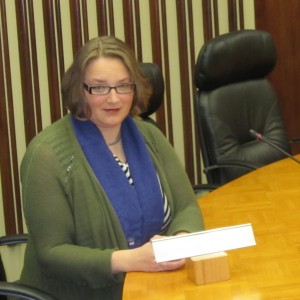 Is this a picture we are going to see frequently> Will there be a change in the name on the name plate at city council? There is clearly a race in ward 1 where two candidates have filed their papers; they now wait for the incumbent Rick Craven to file his papers. One total newcomer, Katherine Henshell and a solid Aldershot resident, Jason Boelhouwer, who thinks it is time for a change, have filed their papers.
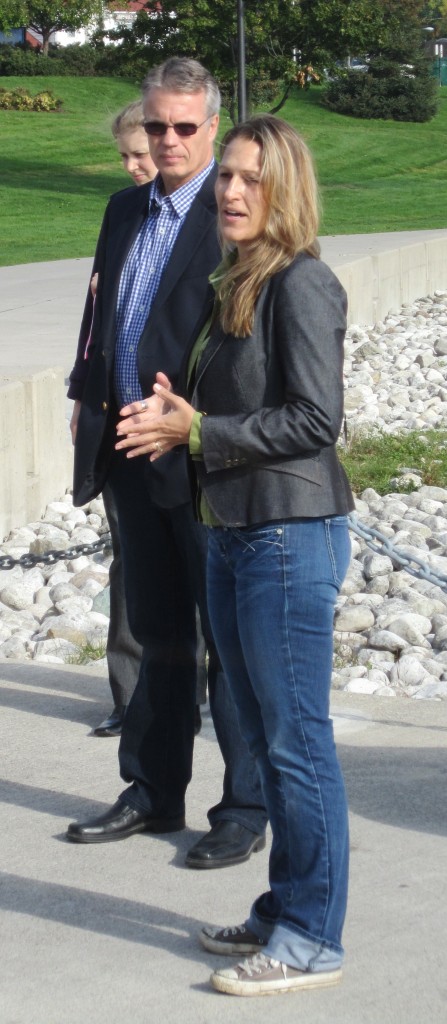 Often, whenever ward 1 Councillor Marianne Meed Ward appears at events with the Mayor she sounds more “mayoral” than the man who wears the chain of office. Ward 2 might be very quiet election night – there is every chance that incumbent Marianne Meed Ward will be acclaimed unless the hurt feelings within the developer community are big enough to have them find a name that can be printed on the ballot to run against Meed Ward.
It will be something to see Meed Ward sit out a campaign – she lives for the game, loves the play and the interaction. A side-lined Marianne Meed Ward is not a pretty picture. Trust her to find a way to insert herself into the election even if she is acclaimed; she could well use 2014 to begin her 2018 race for the office of Mayor.
That kind of thing happened in ward 1 when Jane McKenna took the bait an unhappy property owner put out and ran against Craven – only to be severely trounced. However, that did give her a bit of a profile and she took the bait a second time when Keith Strong came calling with the Tory nomination in his hand. This second run had a well-oiled machine behind McKenna and got her into office. It will take more than a well-oiled machine to keep her there come the next provincial election.
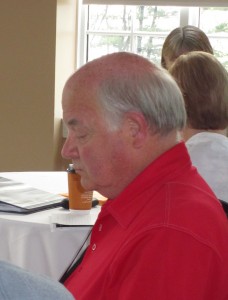 John Taylor, Dean of city Council clearly doesn’t believe in term limits. Ward 3 could be a cake walk for John Taylor – his profile is so high that it will take an exceptional candidate to overcome his name recognition. While Taylor has served the people north of the 407 well, he isn’t one of them and you have to live on one of those side roads to fully understand what rural life is.
For reasons this writer doesn’t understand the rural community has not been able to find one of their own to represent them. Ward 6, which has a large swath of land within its boundaries, is also represented by someone who lives in the suburban part of the city. Burlington’s city council, and the Regional Council as well, desperately needs someone who can speak for the rural folk and represent their interest and life style.
Ward 4 will offer the most interesting race. The incumbent is in trouble but he is redoubtable and is superb at the June to September campaign he runs where he cycles through every street in the ward which runs from Upper Middle Road, Appleby Line, Guelph Line down to the lake, and pours on his charm and bats the baby blues. They have worked for Jack Dennison in a number of his initiatives in his life. Don’t count him out.
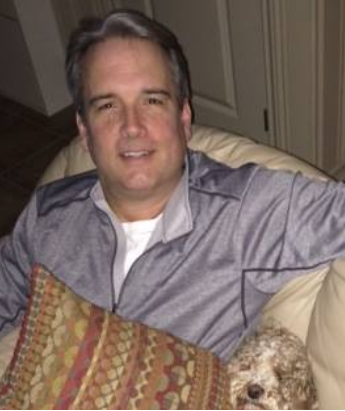 Brian Heagle – seen as a candidate for Ward 4. It is not the dog that wants your vote – could it it beat Brian were it to run? Brian Heagle will run again. Burlington will not be any better off should he win – and he did get within striking distance last time out. They were separated by 1184 votes with Dennison getting 5292. Had he worked a bit harder he could have taken the brass ring – but that’s the problem. Heagle doesn’t do the hard work – and changing his political stripes hasn’t helped him
AND, there is a dark horse out there, thinking it over and taking his time while he decides if elected office is a next step in An already successful career. If this horse is in the race don’t be totally surprised if you find him and Jack Dennison at your doorstep. It is not unusual for an incumbent to decide it is time to leave and do so on the highest note possible. Giving your blessing to a high quality candidate who could well go on to become Mayor in 2018 would add a little lustre to a damaged image in the ward. It might even get Dennison into the Roseland Community Organization.
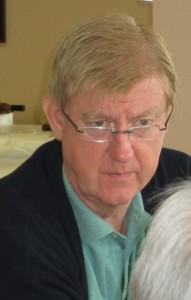 Intense to the point of making delegations uncomfortable ward 5 Councillor Paul Sharman does know how to drill down into the data and look for results. Ward 5 looks as if it is going to produce a flock of candidates. There will be at least three in the race this time with a couple of other potentials mulling it over. There were 9 candidates in 2006 and 7 in 2010. Incumbent Paul Sharman has his work cut out for him. If he can convince his community he has picked up some people skills and can deliver a bit more than parking spaces on the street and make a sound contribution during the budget debates and not throw everything off track the way he did with his 0% increase in the 2011 debates, he might prevail. The ward has a history of putting forward a number of candidates that often turns into a crap shoot with the tumbling of the dice rather than a clear decisive vote count determining who wins.
Ward 6 – another part of the city with significant rural geography but not all that much in the way of population north of 407, has an incumbent who needs to change the image that has emerged. The former Beauty Queen image doesn’t track anymore outside the die-hard Tory base.
 Is north Burlington ever going to get the kind of representation it needs and deserves? It is going to be up to that community to find a local candidate that can draw support from the people south of 407 down to Upper Middle Road. Sarah Harmer – where are you when we really need you? If a solid candidate emerges Blair Lancaster could be in serious trouble. There is however an opportunity for her to show that she is indeed much more than a pretty face with a pleasant smile. Serving as chair of the Development and Infrastructure Standing Committee gives Lancaster an opportunity to show she does have “cajones” and can deliver on the level ward 1 Councillor Rick Craven does as a committee chair. Only time will tell if she can pull it off. She does have the city’s best General Manager in place to guide and support her. If she does make it happen – there will be no stopping her. A strong performance as chair is essential for her to stay alive politically.
The race for the Chain of Office worn by Mayors is totally unknown. Mayor Goldring has filed his papers but other than that there is no sign or sense that he has done anything which kind of reflects his first term as Mayor. We would really like to see a better Mayor Goldring and believe it is in there – somewhere – it’s just not visible – yet.

 January 10, 2014 January 10, 2014
BURLINGTON, ON.
By Ray Rivers
The dealer in a wild-west game of poker was selected by the position of a buckhorn handled knife rotating in clockwise fashion after each hand. If a player didn’t want the responsibility of dealing, he’d pass the buck to the next player. Former US President Truman was given a sign to that effect, which he placed prominently on his desk. The buck stops here – meaning: responsibility will not be passed beyond this point.
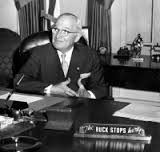 Former US President Harry Truman made sure everyone knew where the buck stopped. New Jersey Republican governor Christie is in the news. One of his staff had shut down a couple of lanes of traffic on a very busy bridge linking his state with New York. This was purely a political action aimed at punishing the mayor of a town at the base of the bridge, a democrat, who refused to endorse Christie. So Christie, a 2016 presidential hopeful, trumpeted that the buck stopped with him then passed it on, denying any responsibility for what his office had done, blaming his senior staff and then firing them.
Doesn’t that sound familiar? Stephen Harper claims he was unaware that his Prime Minister’s Office (PMO) was trying to influence the outcome of an audit into the expense claims of Senator Mike Duffy. Harper the micro-manager, who once told Parliament that he had personally reviewed and accepted the expense claims of Senator Pamela Wallin, orchestrated her and Duffy’s removal from the upper chamber for exactly that reason, both of whom had been his personal appointees. He then fired his chief of staff for trying to keep Duffy quiet and announced the matter closed.
In 2008, 23 people died and 57 others were sickened from eating listeria contaminated cold cuts prepared by Maple Leaf Foods. CEO Michael McCain was praised for his handling of the aftermath of this catastrophe. Maple Leaf is a huge company and this was clearly a mistake, an oversight, by plant staff and the inspectors. But 23 people died and he is still CEO. The federal agency responsible for food safety, CFIA, and its minister had commended McCain on his deportment during the crisis but shrugged-off any responsibility on their part – they just passed the buck to the plant operators.
 Hogs slaughtered and ready for butchering. Perhaps that lack of accountability helps to explain why some four years later CFIA inspectors turned a blind eye at Alberta’s XL Meats. This plant which processes 35% of Canada’s beef had a deregulated inspection system but the company’s own inspectors ignored the deadly e-coli bacteria contaminating the meat tenderizing machines. Fortunately only 18 unwary customers were poisoned by the e-coli bacteria. In a system without consequences why expect things to change?
It was also e-coli bacteria in the water supply, which had killed 7 people and sickened half of Walkerton’s 5000 residents in 2000. The town’s water plant operators received criminal penalties, but the Mayor and his council committee just passed the buck. And the Harris government also passed the buck after having deregulated provincial water testing without considering ways of preventing this kind of incident.
And on the topic of deregulation, the disaster at Lac-Mégantic last year involved a shifty railroad entrepreneur, given a special exemption by the feds to run his train with only one operator. Unsurprisingly, the workload was too much for a single operator who didn’t or couldn’t set all of the train’s brakes, allowing the train to escape and destroy the downtown, killing just under 50 people.
The federal transportation safety agency is trying to shift the blame for this incident to other factors, which they should have known about – the explosive trend of moving petroleum by rail, and the documented inferior tank car design being used. This week there was another fiery train derailment, in New Brunswick. Oil shipments by rail in Canada have leapt from 529 cars in 2005 to 160,000 cars in 2013, but the number of dangerous goods inspectors has remained relatively constant. The ratio of inspectors to oil carloads over the period has crashed from 1:14 to 1:4000. Is there any wonder we are seeing this?
China experienced a tragic health event in 2008 when its state-owned Sanlu Group poured melamine (a product associated with kitchen counters) into infant formula to artificially raise protein levels while they watered down milk in the product. After several babies died and hundreds of thousands were sickened (imported pet food in North America was also affected), Chinese authorities beheaded those who had engineered the deadly plot and imprisoned the milk company CEO for life.
China takes responsibility seriously although the buck did stop short of the communist party. Beheading is not yet a part of Mr Harper’s tough-on-crime policy and in any case we need to observe that higher law – you know, the one in the scene from the Mikado – let the punishment fit the crime. So life imprisonment and beheading are out of the question even if you chose your senators poorly and are a control freak.
Under Mr. Harper’s crime legislation there is a mandatory six month prison term for anyone cultivating as few as six marijuana plants in their backyard. Yet, I have never heard of anyone dying from smoking pot, not even Rob Ford. So what about some time in the ‘big house’ for those whose crimes really kill, like e-coli, listeria and flaming trains.
 British Columbia’s fragile aquatic environment could be at risk. Who will be passed the buck when the first tanker full of Northern Gateway dirty oil hits a reef in the fragile aquatic environment of B.C.’s coast – a project exempted by Harper from proper environmental assessment? Who will the buck be passed to when the federal government finally admits Canada will never meet any of Harper’s international commitments on global climate change – but will, instead, further increase our emissions, contribute to climate change and more of the unpredictable weather events we saw in 2013.
Perhaps our federal leaders misread Truman’s famous phrase, thinking he was referring to a dollar bill – even though those don’t exist here anymore. And the US sawbuck (ten dollars) is crashing over our own ten dollar bill as our exchange rate keeps deteriorating. That has got to be hurting snow birds looking for that much-needed southern break each year.
It is little comfort to know that your government will not increase your taxes when all your other costs rise instead. Canada has always been a trading nation but why have we decided to start trading our living standards down to third world standards. And who will take responsibility for the failed and divisive economic policies that are leading us to this economic state – a government fixated on tar sands oil development at the expense of economic development in the rest of the country, or even Alberta. It’ll be somebody else’s fault I’m sure.
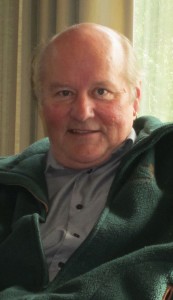 Ray Rivers writes weekly on both federal and provincial politics, applying his more than 25 years as a federal bureaucrat to his thinking. Rivers was a candidate for provincial office in Burlington where he ran against Cam Jackson in 1995, the year Mike Harris and the Common Sense Revolution swept the province. He developed the current policy process for the Ontario Liberal Party. Ray Rivers writes weekly on both federal and provincial politics, applying his more than 25 years as a federal bureaucrat to his thinking. Rivers was a candidate for provincial office in Burlington where he ran against Cam Jackson in 1995, the year Mike Harris and the Common Sense Revolution swept the province. He developed the current policy process for the Ontario Liberal Party.
Background links:
The Buck Stops Here Chris Christie Maple Leaf Foods XL Meats XL Meats 2
Melamine in China Lac Megantic Punishment Fit the Crime


By Pepper Parr
BURLINGTON, ON January 4, 2014
When we began publishing an on-line newspaper for Burlington the hope was that we would better inform the public and that an informed public would make informed decisions.
We took our leadership from the Shape Burlington report that focused on what that document called Burlington’s information deficit.
I was mentored by the late John Boich, a co-author of the Shape Burlington report, whose wisdom, guidance and approach to life I deeply miss. His boisterousness and his care, concern and love for his city were present in every word he uttered. “Ya think?” he would bellow.
When Burlington lost John Boich, I lost a friend and the best guide I had as to how this city works. One of the things Boich and I wanted was a publication that was fearless, opinionated, open to all opinions; a publication that would pull out the very best from the people of this city.
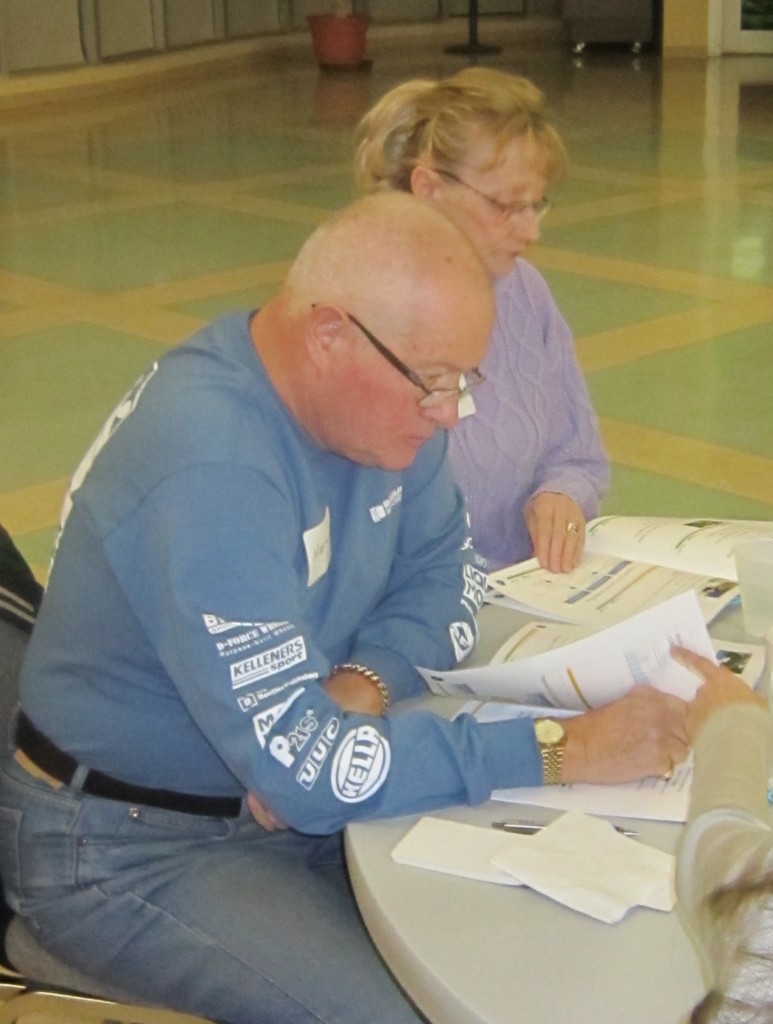 Burlington has always had a small group of citizens who get out to public meetings to review budgets, policy proposals and share ideas. In that regard we are fortunate. With the internet as our platform rather than a printing press there was an immediacy that allowed readers to respond. Because we were online and the contents of the newspaper were searchable readers could go back and check out what had been said or done months – even years before.
The ability for people to comment was important to us. Unfortunately, a lot of the comment is pretty juvenile, poorly stated and often nasty and mean.
We publish the name we are given. If there is a concern with the contents of a comment we will test the email address it was sent from. If invalid we frequently do not publish the comment.
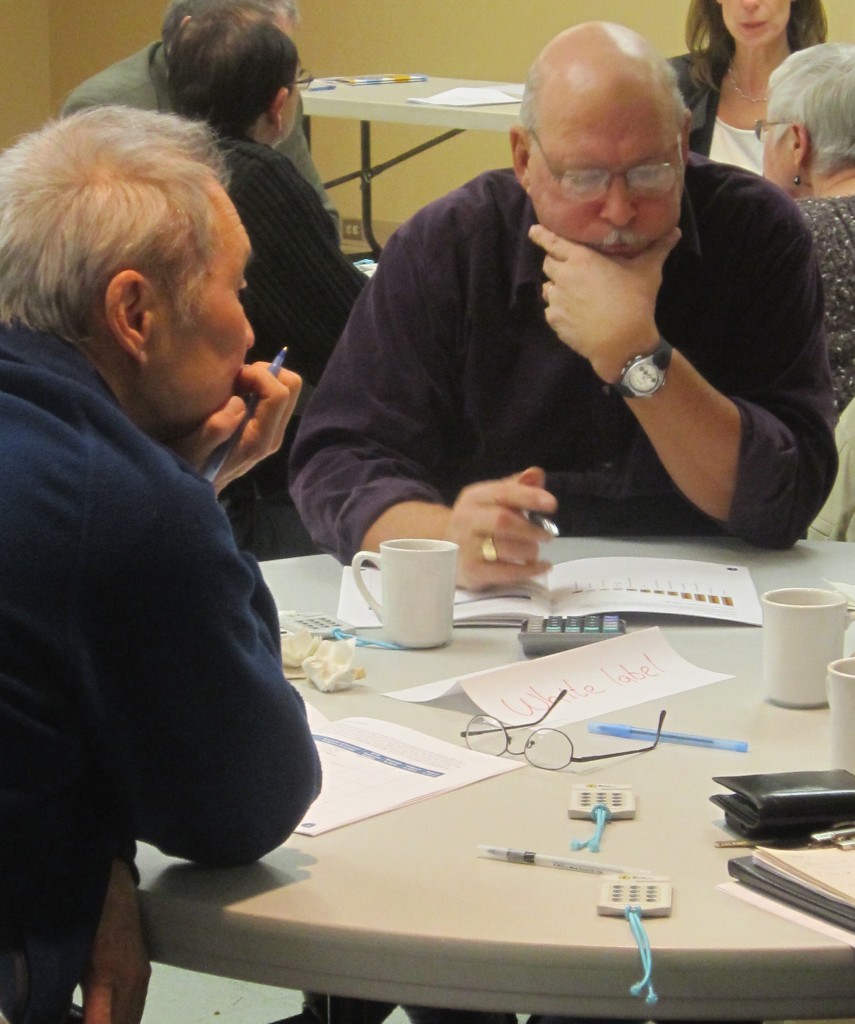 Intelligent people looking at the numbers and making their own decisions: democracy at its best. We frequently talk to the writer and on several occasions we have insisted on meeting with the author. Our objective is to create a forum where views are exchanged and the community at large is better for that exchange.
There have been some comments that were scurrilous, some with terribly foul language. Others have contained information that while not publishable are an insight into behaviour that bears watching.
From time to time we get a comment that represents what we set out to do ourselves. Comments made on the first person in Burlington to file nominations for the ward 1 seat in the October municipal election came in quickly. The comments made by one commentator in particular were informative and we felt useful. This is what we set out to do as a community newspaper – we commend these comments to you:
Rick Craven used to be an effective municipal leader. He listened to ideas, asked questions, worked hard to make a mark for Burlington. All under the great leadership and mentorship of Mayor MacIssac and a fantastic City Manager, Mr. Tim Dobbie. Then came the Cam Jackson era. Craven turned from an effective leader, and a team player, to a one man “lets battle the bully” show. He became a bully himself. He forgot how to be an effective leader, he lost the will to listen, all he wanted to do was fight.
 Burlington citizens discussing a draft of the city’s budget. Councillor Craven is on the right wearing the blue shirt. He’s never regained his better persona of a good leader, instead Craven enjoys continuing to be the bully. You see it at meetings of Council, in the media….. he just loves to bully delegates, others who have different opinions, and the member of council sitting to his left in Council Chambers. If it’s not a fight for him it’s not worth his time. His “my way or the highway” style has become totally ineffective.
Yes, Ms. Henshell, and many who will put their names forward to run in the 2014 election, may not have the political experience at the starting gate. You do have to learn to crawl, then walk, then run. However I’ll vote for emotional intelligence, a team player, and on the job training any day rather than 4 more years of watching a sarcastic, ineffective bully trying to make his, and “his only”, mark.
Mr. Craven has lost the personality it takes to be a good leader. He needs to learn to crawl again, and walk again before he should ever “run” again. It’s a seven member city council, not a one man show. He needs to be re-taught just that instead of continuing on with the selfish traits he once despised.
A break from Council Chambers would be in the best interest for Mr. Craven if he has any bigger political aspirations. Is he a politician…. yes. A great political leader… I beg to differ.
This kind of trenchant observation and the courage to speak is something we welcome and encourage.


By Pepper Parr
Burlington, ON. January 4, 2014
This is the time of year when everyone thinks about the year that came to an end and the year that we are now into. How did I do? Can I do better next year and how will I do that?
What did Burlington as a city do right and what did it get really wrong. Just one of each.
The city’s best decision: Deciding to take on the Burlington Executive Air Park and their blatant attempt to use federal regulations as an argument for not adhering to municipal bylaws.
The city’s worst decision: The decision to sell a small strip of land along the edge of Lake Ontario that runs between St. Paul and Market Streets to private interests.
The best: While both the city and the Regional government should have been on top of these problem years ago, Burlington is at least doing something about the problem now. The Region is still dragging its heels on this one.
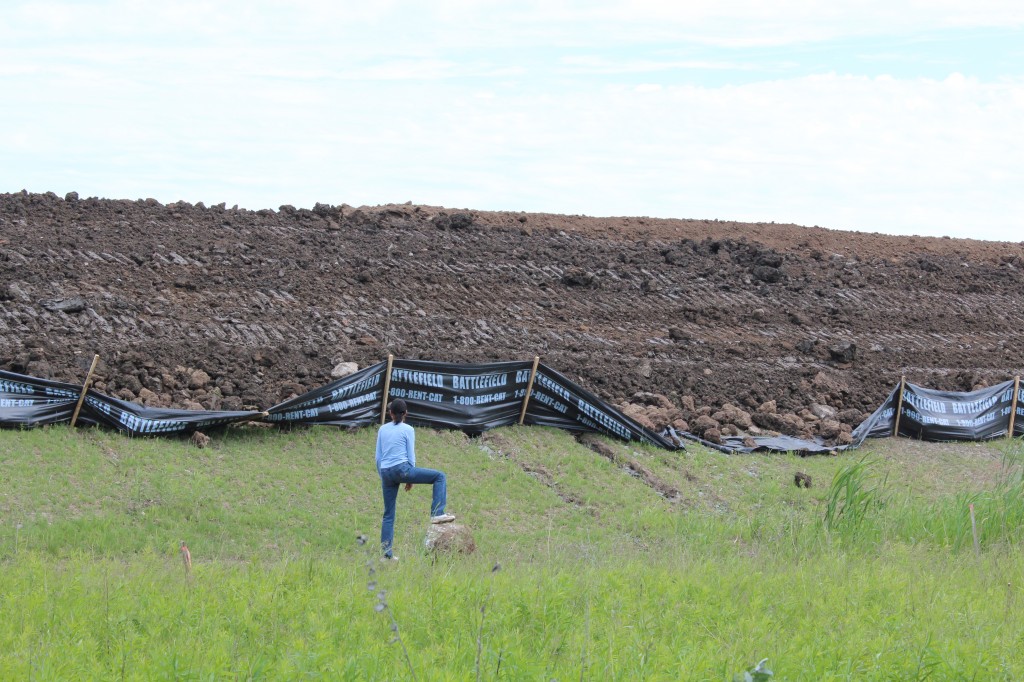 Somehow the owners of the Burlington Executive Airpark convinced everyone that his plans came under federal jurisdiction and that the city had no say in what they chose to do. This location was to be the site of a helicopter operation. The owner of the adjacent property is standing on her property line. While north Burlington residents have been complaining for some time about the problem related to literally hundreds of trucks taking land fill into the air park property on Appleby Line and dumping it they weren’t getting much in the way of response or satisfaction from city hall or their Council member..
It was when Vanessa Warren formed the Rural Burlington Greenbelt Coalition and delegated to Burlington’s city Council and then to the Region that things began to happen. City Manager Jeff Fielding had no time for a lawyer trying to instruct the city on where they were wrong and General manager, Infrastructure and Development, Scott Stewart had no time for organizations that refused to follow the city`s bylaws.
It took the city administration a bit if time to get a handle on the scope and scale of the problem and to get a clear picture of the kind of corporation they were dealing with, but once the think part of the job was done – it didn`t take long for the city to move with considerable force and dispatch. Within months the city and the Executive Air Park were in a court room to determine just what the legal issue was and then set a date with Justice John Murphy who listened to three hours of arguments. A number of weeks later he issued a decision stating that Burlington`s site plan bylaw was valid and had to be adhered to by the Air Park – and then he dinged the Air Park for $40,000 in costs.
The ink wasn`t dry on Justice Murrays decision before the Air Park filed an appeal. That appeal will take some time to be heard in the late spring at best. It may well go to the Supreme Court of Canada. It is a critical decision if Burlington is to control the kind of development that takes place in north Burlington. Vince Rossi can build an airport up there – but he will have to follow the rules and work with the city
Rossi, owner of the Executive Air Park has a $4.5 million mortgage on the property and right now his business plan is in close to a complete shambles. Rossi took a significant risk and while the end game is not fully known, and one never wants to guess how a judge will decide an issue – there are a number of very strong reasons to believe that the city of Burlington will prevail and the Air Park will have to comply with the bylaw which will mean significant scaling back of the 30 foot plus piles of landfill.
A bigger concern to the city is – what happens to the air park should the city win the case? Does all the landfill have to come out? What kind of an air park will be left. Something to think about.
The worst decision the city made was agreeing to sell a number of small pieces of property, some owned by the city other pieces owned by the province to three property owners with house that are at the edge of the lake.
Burlington takes great pride in its waterfront and part of its plan is to put as much of the waterfront property in the hands of the public. The city is now part of a process that is intended to purchase 30 homes currently in Beachway Park, see them demolished and the land cleared for a public park.
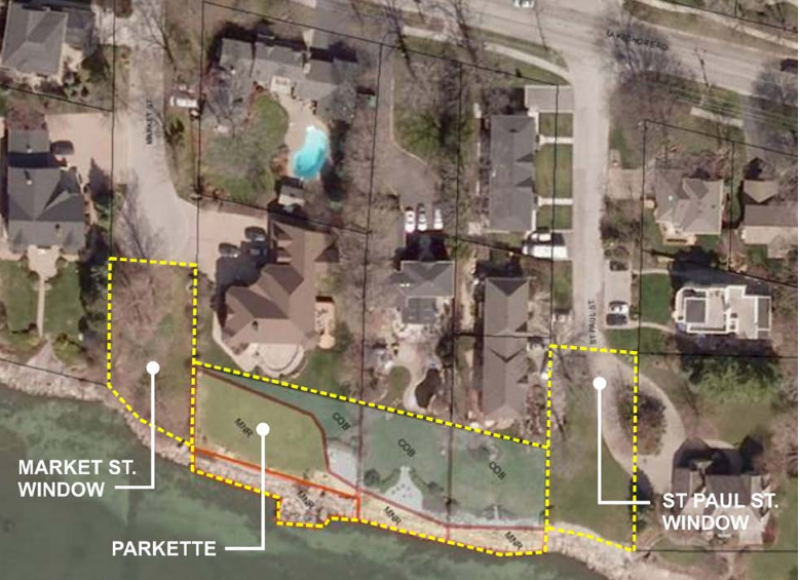 The city would create two parkettes on the extreme east and west side of the lands shown. The part in the center, outlined in a yellow dotted line is a combination of land owned by the city and the provincial government. There are three property owners with homes adjacent to that portion. The one on the left and the one on the right consists of two homes between Lakeshore Road and the water’s edge. The one in the center will become one of the most valuable sites in the city should the sale of the public lands actually go through. That owner will have a piece of land that goes from LAkeshore Road to the water’s edge. At one point the city had a Waterfront Access Protection Advisory Committee (WAPAC) that did some sterling work on opening up small parcels of land the city already owed for public use. Little did they know that the recommendations they put forward would be twisted and made part of an arrangement that would see small parkettes at the ends of St. Paul and Market Streets and an upgrade to Nelson Park which is a couple of hundred yards to the east of the waterfront properties the city decided to sell.
While the selling of the land to private interests is not yet a done deal – it is being worked at and should it be made final and the land sold the opportunity for a pathway that would extend across more of the waterfront for public use will be lost forever.
The purchase of the land for one property owner will rank alongside the deal the Dutch made with the Indians for Manhattan Island. People in Burlington talk about there never being high-rise condominium development along the edge of the lake when that is what we already have in place.
The only Council ember to vote against the sale was Ward 2 Councillor Marianne Meed Ward.
The Bridgewater project is going to see a 22 storey tower go up on a piece of land that is not much bigger than the lot that will be created should the sale of public lands go through.
It won’t happen tomorrow, might be 50 years before there is major development on land the city now owns between Market and St. Paul streets – but with all that land in the hands of one owner – developers drool for opportunities like this.
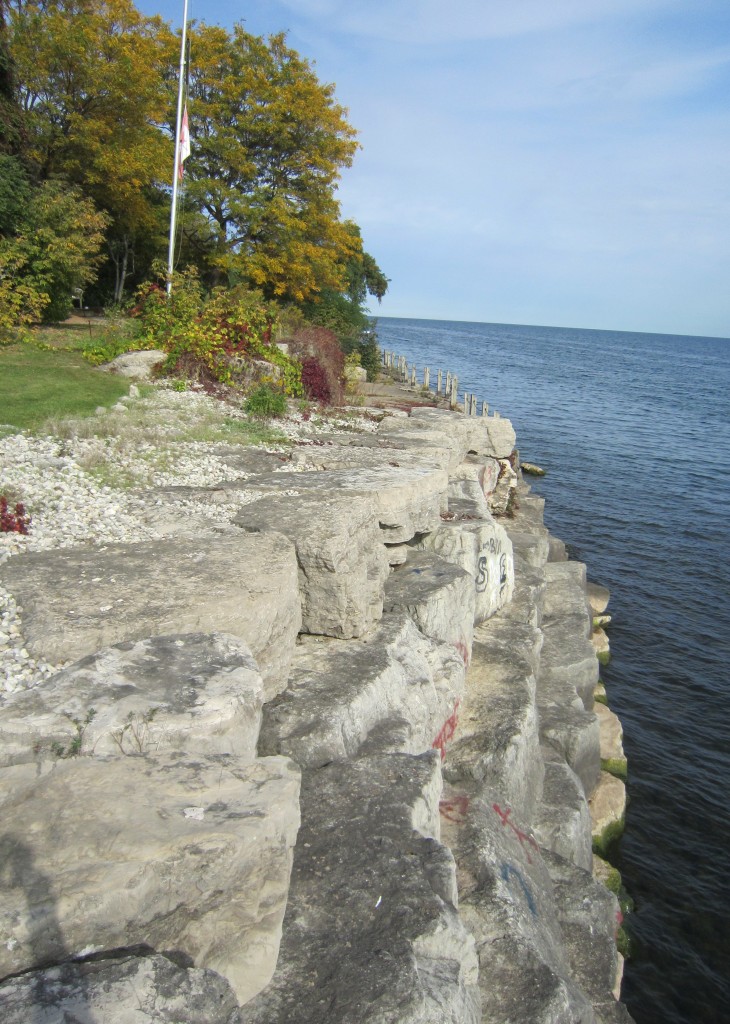 That shore line and the view of the lake is a part of the birth right for every citizen of the city. City Council had no right to sell that property for once it is gone it will be gone forever. When the city agreed to sell the land that was once part of the old Water Street – they sold a part of the birthright of the people who live in Burlington. Wiser city Councillors elsewhere in this country would die for an opportunity to do at some point in the future what Burlington is preparing to give up on.
Worst decision the city could have made. There was an opportunity to lease the land – city chose instead to negotiate the sale of the land. The private property owners will be pushing their lawyers to get this deal done before it becomes an election issue when wiser minds might get themselves elected to Council and put a stop to this stupidity.
Background:
Unlicensed dump
The background on the landfill dumping.
Water street: The issue:
City agrees to sell waterfront properties.

|
|
























 It will not be too long before rules like that are going to apply to seniors.
It will not be too long before rules like that are going to apply to seniors.





 Heck BEDC can’t get themselves to the point where they are ready to go to market and find the person they need.
Heck BEDC can’t get themselves to the point where they are ready to go to market and find the person they need.















 Still, less than ten percent of Ontario’s labour force work for a minimum wage, about half a million workers.
Still, less than ten percent of Ontario’s labour force work for a minimum wage, about half a million workers. But not all conservatives are spooked by innovative approaches to eliminating poverty.
But not all conservatives are spooked by innovative approaches to eliminating poverty.

















 Calgary journalist Chris Turner has written a book,
Calgary journalist Chris Turner has written a book, 


 His strategy begins by cutting corporate taxes to 10 percent, the level former Premier McGuinty was targeting before Andrea Horwath and minority government stopped him.
His strategy begins by cutting corporate taxes to 10 percent, the level former Premier McGuinty was targeting before Andrea Horwath and minority government stopped him.




























